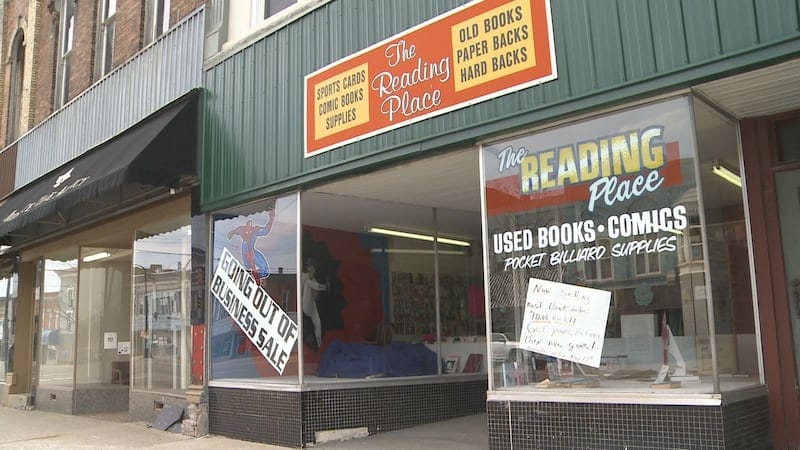My Favorite Comics of 2024
The most sequential of the arts
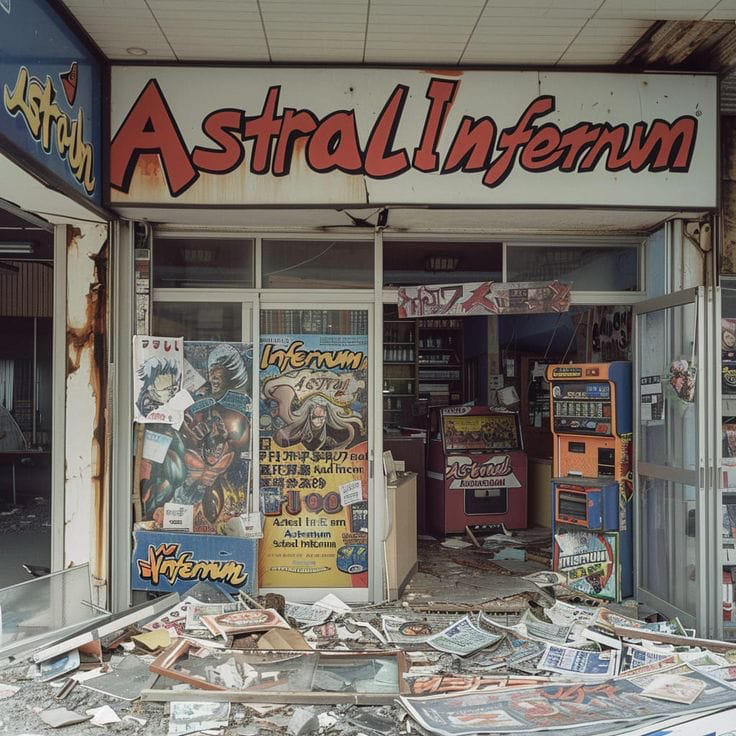
Wednesday is the day when the week's new comics come out, which means that Wednesday is Comic Book Day!
But unfortunately, like a big glob of shit thrown into a still pond, the harm being inflicted upon our society–on our entire world–by Trump and his rancid horde of Nazis, bigots, transphobes, billionaires, and White Christian Nationalists, not to mention the White Centrist scumbags who enable them, ripples out to touch every shore, and one of those shores is comicbooks.
Most American comics are printed in Canada. That means, should our ever-impending Trade War (or even just a regular war) with The Land of Living Skies finally reach fruition, it will be the final nail in the coffin for an industry that was already more than a bit wobbly, especially after Diamond Comics Distributors recently filed for bankruptcy.
Marvel and DC comics will be fine, of course. They have other revenue streams that make boatloads of cash, and comic books haven't really made money in a long time. Really, WB and Disney haven't really given that much of a shit about comics for years. At this point, they treat comics more like loss leaders, as testing grounds for new ideas. But should Trump's Idiot Tariffs ever really happen, or should he actually try to absorb Canada and force it to be the 51st state, one of the immediate reprecussions will be massive cuts and lay-offs at the big studios, like Marvel and DC and Image, not to mention multiple title cancellations, while most of the smaller studios will probably just fold outright.
It will be a bloodbath.
And once the smoke clears, the few books that survive will most likely be priced beyond what most people will be willing to justify for 23 pages of sequential art on paper, which means that comic book shops around the country will shutter. And that, at least as far as the classic monthly pamphlets are concerned, will be the end of the industry. It will also be one more step–however small it may be relatively–towards not just the true and final end of American Democracy, but the vast web of its economy, which means the people's lives, liberties, and their ability to pursue happiness.
So many Ends of Eras all wrapped up together...
This would also mean the end of comics for me too, something that's been a regular part of my life for... as long as I have memories, basically. It's a silly little stupid thing, I know, but now it's one more thing for the pile that White America's hatred, entitlement, and unadulterated love of cruelty has destroyed for the rest of us. And it would be the end not just for financial reasons, but personal ones too. Yes, there will still be digital comics. At least, until White America destroys, or privatizes the internet (so they can silence any voice that isn't theirs, most likely in the name of "protecting the children"). And I don't hate digital comics. I like, and even recommend a few, but... they're not my thing. They're just not the same, and I don't really enjoy reading them. I feel the same way about e-books, I don't like the format. So, if that day should ever come, if the comic shops all close, if the paper comics are all gone, then I'll just walk away. C'est la vie.
Honestly, I should probably say "when" not “if.”
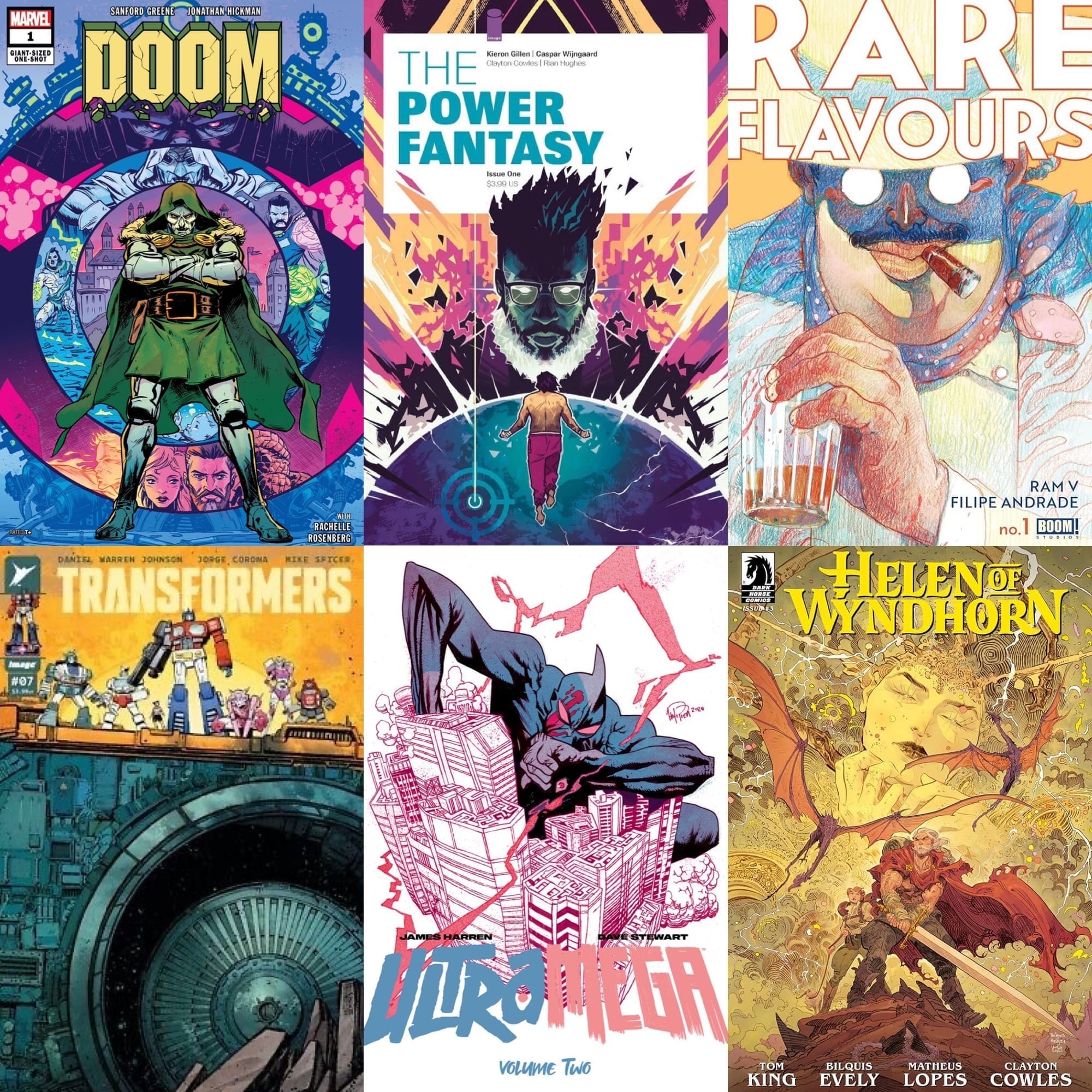
Because when it comes to the current state of comics, much like everything else right now, Trump didn't cause any of it... he just sped up the clock. Trump didn't create this reality, just like he didn't create the shitty fucking bigots, transphobes, and Christian Nazis that voted for him out of their hatred. No, they are who they have always been, and this is the path that comics have long been on.
So yeah... between the ever-rising costs of producing and distributing the flimsy little monthy paper pamphlets, not to mention the simple fact that, due to video games and streaming, as well as the proliferation of superheroes on TV and on the silver screen, there are basically no new crowds of comic book readers left to speak of... much like with video rental stores, this–the end of comic books as a physical thing–was all gonna happen eventually. It was inevitable.
The current world just sped up the clock.
People like me? The old fans? We're just dinosaurs living in comic books' Cretaceous Period. I'm just a Comic Book Nerd Tyrannosaurus Rex, standing on a sandy beach along the shallow waters of the Western Interior Seaway, and all I can do is watch the asteroid roar past overhead, a long plume of fire burning across the sky as it archs down towards the Yucatan Shelf and what will very soon become the Gulf of Mexico. It's just me and my little tiny arms, slowly chewing on the bloody remains of a too-slow Magic the Gathering-loving Triceratops, and heaving a big sigh: "Welp... it was fun while it lasted."
Of course, the asteroid hasn't hit yet. Right now, everything's still chugging along here in the Cretaceous Period, muggy as fuck and super buggy, but it's still coming. It's definitely coming. Not just for comics either, but for all of us, for everything. In fact, if you look in the right places, with the right kind of eyes, you can see it, like a celestial pale rider coming out of the great darkness, burning its way down towards us in its thundering, inexorable, ineluctable inevitability.
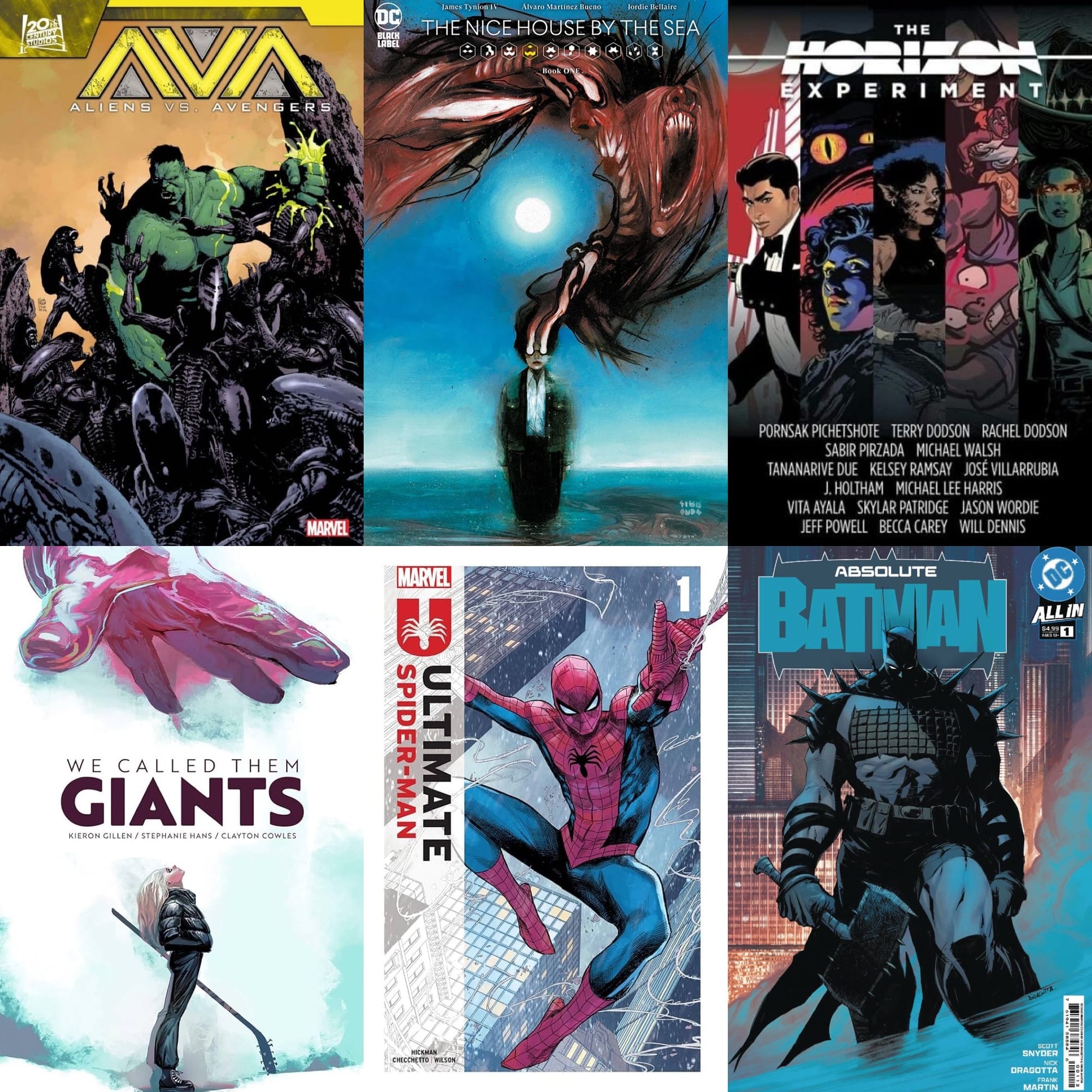
But, fuck it... whatta ya' gonna do, right? No use crying over a global spike in iridium. I mean, if we're being honest here, is an Extinction Level Event really truly anyone's problem? It seems like it's above our paygrade. Besides, there are more than a few learned folks out there who think that the dinosaurs were already on their way out too, and that their end was merely accelerated, not caused by, that cosmic hammerblow from outer space.
So, whether or not the clock is sped up, like Johnny said... nothing gold can stay.
All things end.
In the meantime, I guess we'll have to take what comes, right? We'll have to play the hand we're dealt, let the great clockwork of the galaxy spin on its own axis, and deal with what's in front us... Like finding ways to help out in our communities, like telling the local Nazis and bigots and transphobes to fuck off every chance we can, like being sure to hound bigot politicians, and never allow them a moment of peace, not at home, not at the office, and especially not when they're out in public. To the gallows, the grave, or early retirement. Because only bigots preach about finding common ground with bigots. I mean, if comics have taught me anything, it's that the only good Nazi is a dead Nazi.

Maybe that's just me.
Anyway, we're here today to talk about my favorite comic books for this shitty ol' year, so let's get to it. If you're interested, here’s last year’s list of my favorites. If you're not, no problem, let’s jump straight into…
This Year’s List!
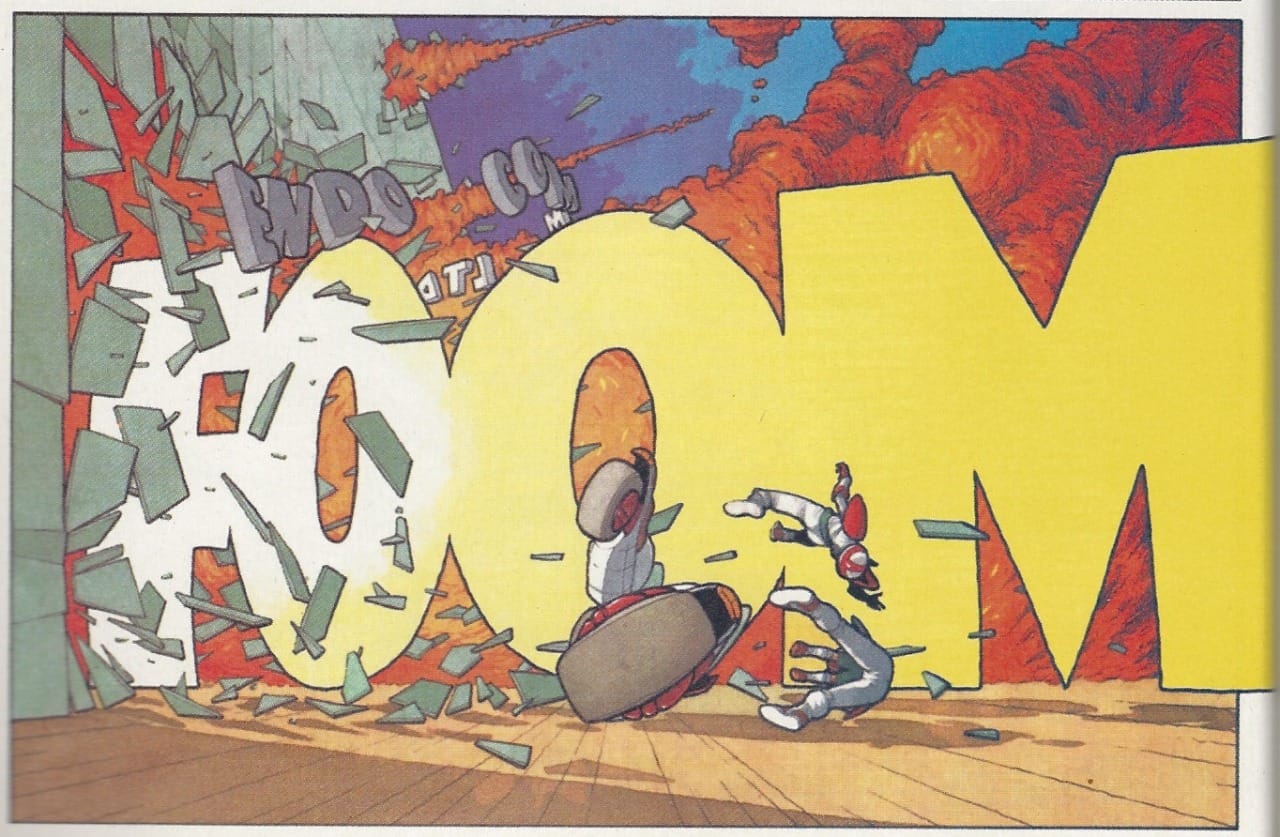
Doom
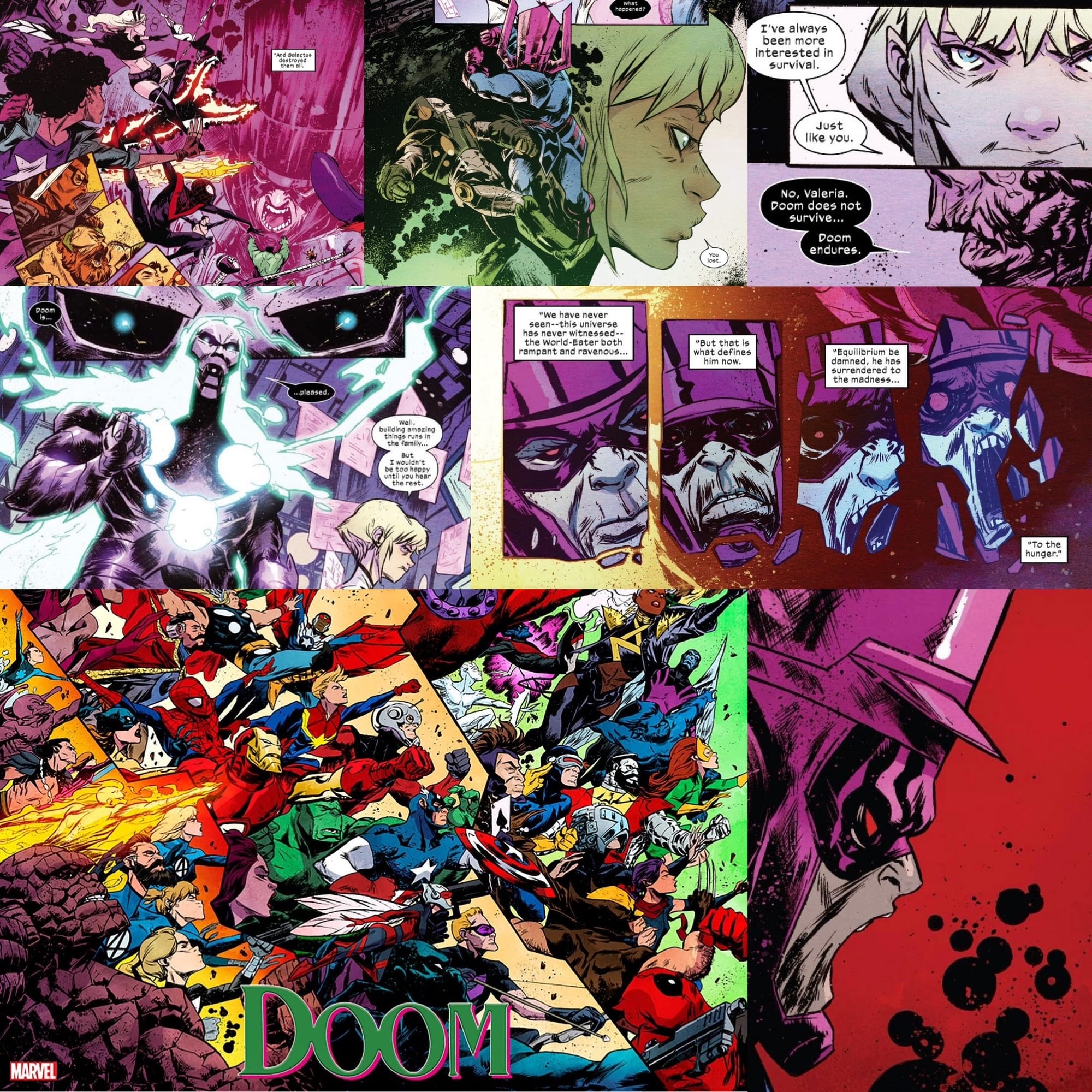
In a dark near-future, Jonathan Hickman and Sanford Greene send Doctor Doom on a journey across the galaxy. Determined to stop the death of the universe, along with help from his "niece" and fellow super-genius, Valeria Richards, Doom faces the World-eater known as Galactus, an ancient cosmic entity who has been driven mad by his insatible hunger!
This is a classic story of Marvel's primary supervillain–the super-scientist, the master of the mystic arts, the megolimanical monarch of the country of Latveria–Dr. Victor Von Doom, or simply... Doom. Above all things, Doom lusts for power, and is a threat of the highest order, a world-taker and a world-breaker. He's great at everything he does. He's smarter than almost everyone. Most importantly, he is willing to do whatever it takes to accomplish his goals, for he is Doom. And Doom fears nothing or no one, and none are his equal.
Except for maybe Reed Richards of the Fantastic Four.
When they were young men at State University in Upper New York, Reed spotted an error in Doom's equations, and in his pride, when Reed attempted to correct the error, Doom rebuffed him. His experiment exploded in his face, injurying him, and in his shame, Doom withdrew from State. Thus, his life's journey began... Blaming Reed Richards for his facial disfigurement, he now wears a magically-forged suit of high-tech armor, with a metal mask and a hooded cloak, to conceal a small scar on his face. To Doom, that scar mars what Doom otherwise sees as perfection, and is a daily reminder in the mirror of how Doom was once bested.
Doom has held a grudge against Reed Richards ever since.
Doom also speaks of himself in the first person.
This is why, in this book, we see Doom facing off against the cosmic entity known as Galactus, an ancient being, constantly moving through the cosmos, devouring planets in order to temporarily sate his eternal hunger. But the hunger has finally won, and Galactus has been driven mad by it, and he is now destroying the galaxy, consuming it. Reed Richards and the heroes and villains of Earth, as well as heroes and villains of the galaxy, all failed to stop the World-Eater, so now Doom will do what Reed Richards could not. His "niece" Valeria Richards, the daughter of Reed and Sue Richards, knows her "uncle" Doom well, which is why she saves him at the beginning of the story, and after explaining to him how her father had failed, why she then points him directly at Galactus...
Because Doom can do anything, if he wants it badly enough.
This comic is a good example of the synergy between Marvel and DC comics (known as The Big Two) and their Film and TV interests. This particular comic book called Doom, just a single special issue, is mostly meant to reintroduce the character to Marvel fans. Doom has been on the shelf for a while now, because you can't trot out a big gun like him every month, and he's only properly used when there's a big story to tell, a special event. So this comic, basically a What if story, was meant as a reminder of who Doom is, and to get him ready to be a major villain in the comics again, a position he is currently enjoying. Marvel wants nerds to start talking about Doom again, y'see, because within the coming year, he'll start showing up in the MCU too.
Doom is the MCU's next Thanos.
Back in the day, as the MCU was getting ready for the next big story, the kind of Mega-franchise encompassing thing like they did with Thanos and the Infinity Stones, it was supposed to center on the character of Kang the Conqueror. But there have been some issues. So now Robert Downey Jr. has been brought out of retirment, and he is going to be playing the role of Doom, most likely beginning in the new Fantastic Four film (where Galactus makes an appearance too, as you can see in the trailer),a film that is supposed to start out in an alternate universe.
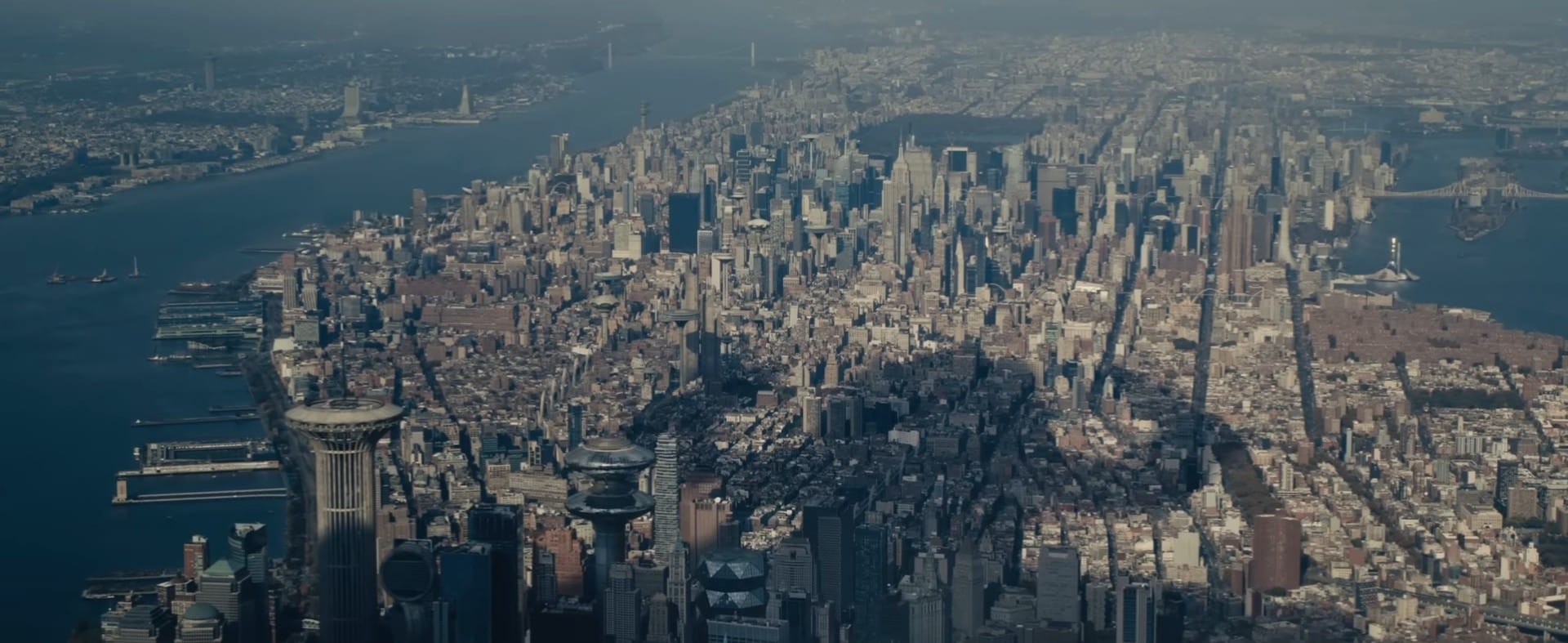
But how can Downey be both Tony Stark and Victor von Doom, you ask? I guess we'll see, but I assume the Multiverse is the entire answer. And it's not going to be completely out of left field either, as Stark, Doom, and Reed Richards have always been connected. In fact, their family lines may be the anscestors of Kang. I don't know if any of that is going to figure in at all, or if it's just a little bit of serendipity, but either way, just thought I'd share that little factoid with you.
Another little happy coincidence between film and comics is the fact that the best modern Doom story can be found starting in the pages of the Fantastic Four: Dark Reign mini-series, then on to the main Fantastic Four title, starting with #570, as well as its companion title FF#1, then jumping over to the Avengers/New Avengers #1 issues, and following that all the way into the Secret Wars. It's a huge sprawling story, lots of fun, very cool, with a bunch of wild shit happening, like when Doom takes out Thanos...
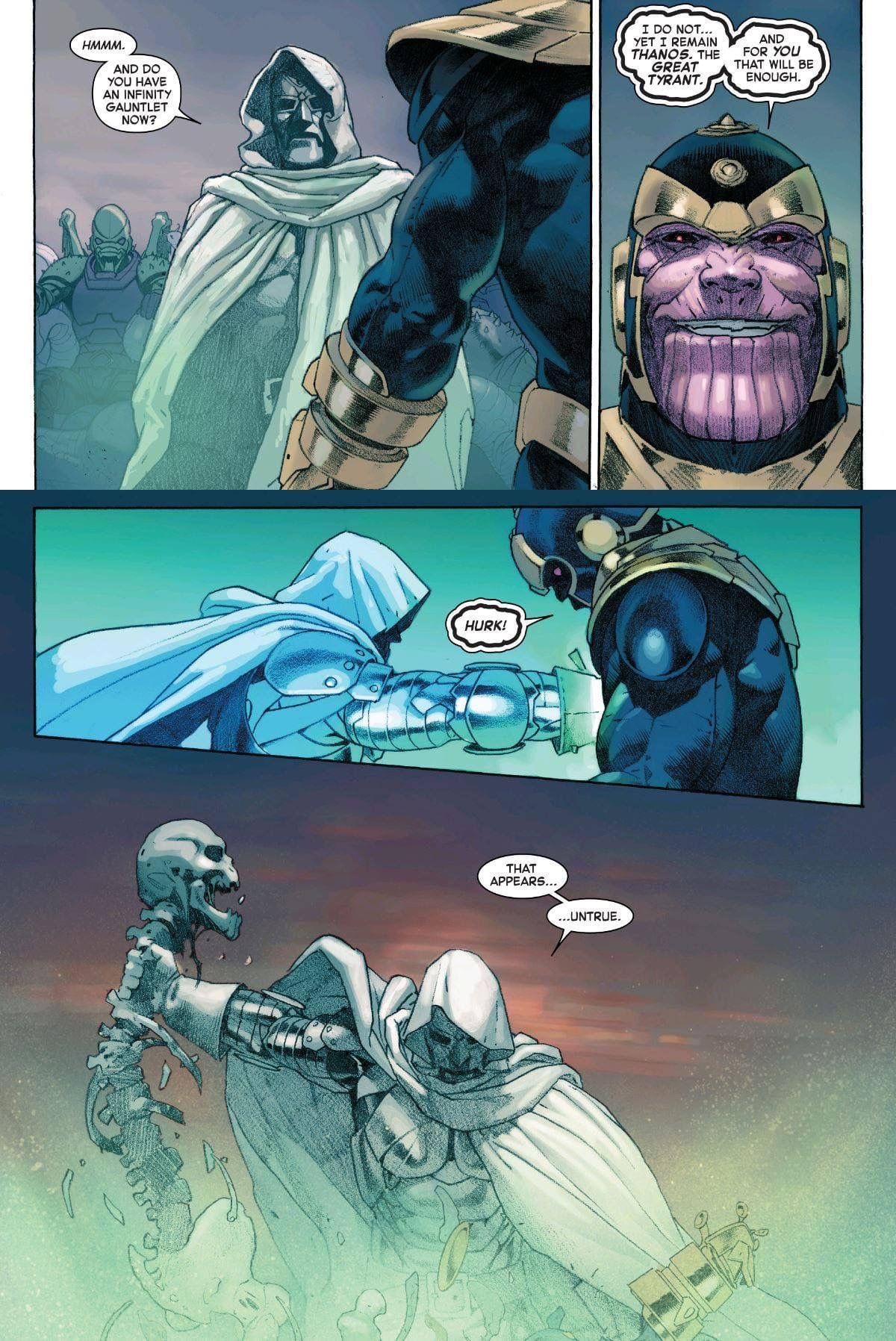
But mostly, that story is all about Doom and Reed, and it's very satisfying and well-done. Maybe the best comic book crossover ever done. I bring this up, because the rumors all point to this story as being the basis for the MCU's upcoming plans.
We'll see.
Anyway, long story short, Sanford Greene's art is great in this comic, and the story is too. Plus, it was written by Jonathan Hickman, the same person who happened to write that great Doom story I just mentioned. Bottom line? It's a fun little self-contained adventure that provides a good little insight into an excellent villain.
The Power Fantasy
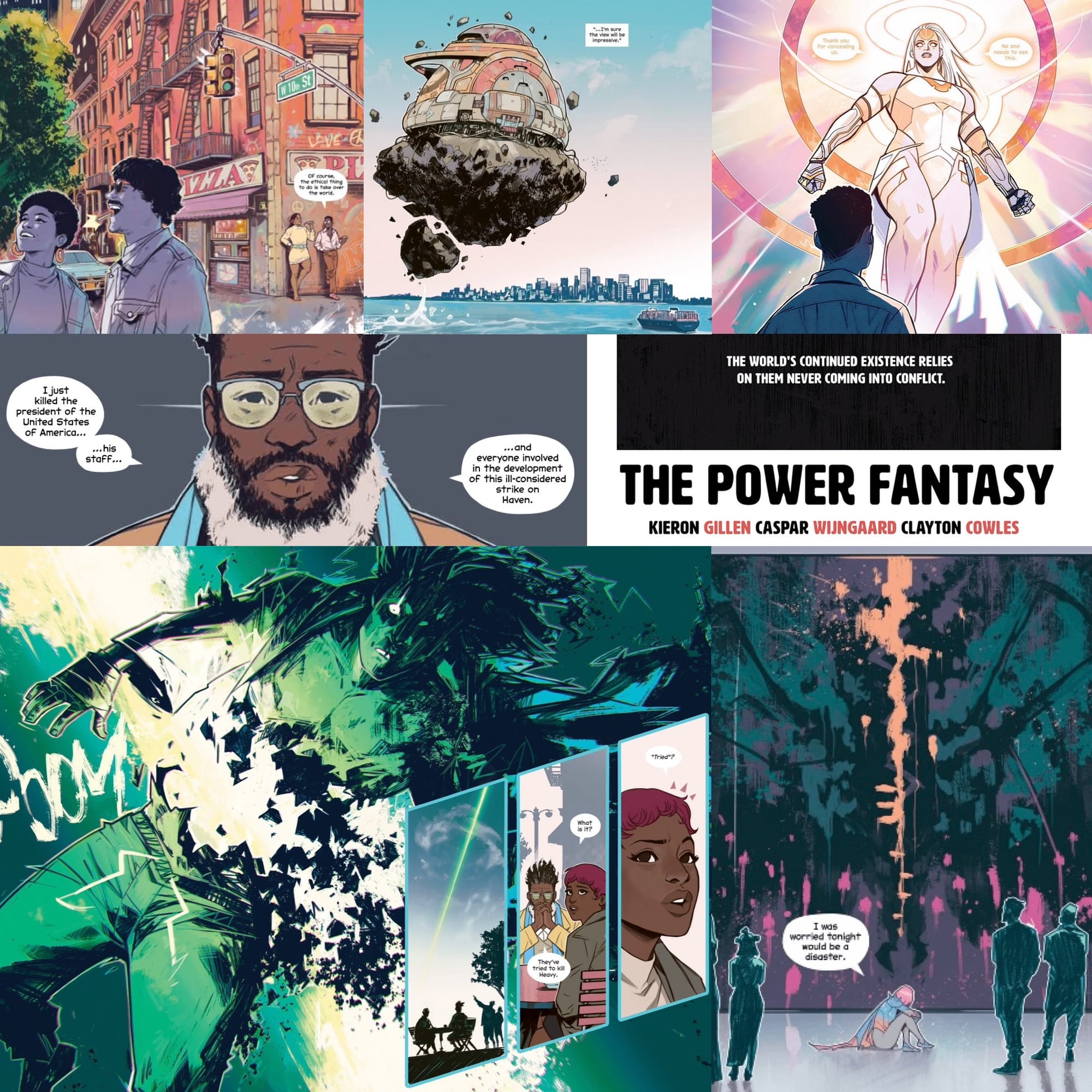
The word “Superpowered" comes with certain preconceptions. In The Power Fantasy, by Kieron Gillen and Caspar Wijngaard, they are proven to be incorrect. Here, that word has a very specific meaning. "Any individual with the destructive capacity of the nuclear arsenal of the United States of America.” There are six such people on Earth with such capabilities, and the planet’s survival relies upon them never coming into conflict.
This comic is fairly new. We only have the first "chapter" in essense, the first six issues, and the very beginning of the second, but it is a meticulously crafted and plotted story of an alternate history where the first test detonation of the Atomic Bomb gave the world superhumans, and while most people with these abilites are moderately powered at best, there are six who could destroy the world, especially if they were to fight each other. All of them are pretty familiar archetypes. There's the Superman, the Raging Beast, the Master of Gravity, the Powerful Psionic, the Magic Man, and the Demon. They are all Persons of Mass Destruction.
This story is a slow boil about a world walking a thin line, a delicate balance between unstable personalities where mutually assured destruction doesn't seem like it's the most likely outcome, but that eventually... it will be the only outcome. It's a superhuman Cold War on the verge of getting very hot. Especially because the U.S. government is definitely trying to either exploit or destroy them all.
I'm very interested in reading more.
Rare Flavours
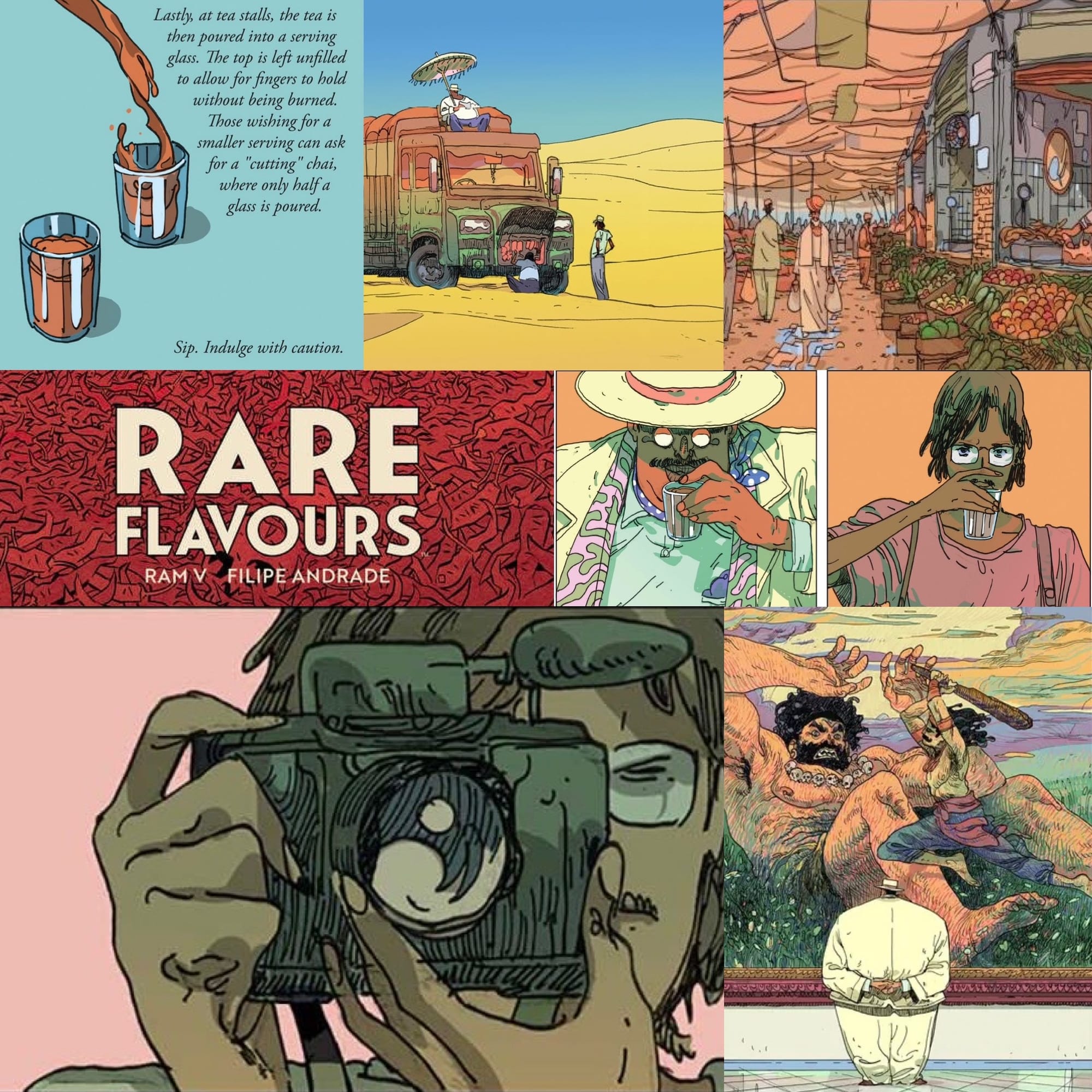
Ram V and Filipe Andrade tell a story about food, art, the celebration of life, and Rubin Baksh, a demonic Rakshasa, who dreams of becoming the next Anthony Bourdain. To make his dream come true, Rubin enlists Mo, a down-on-his-luck filmmaker, and tasks him with documenting the world-renowned cuisine of India and the people behind it's flavourful food. Little does Mo know that there’s more to Rubin than meets the eye, and that he and all the other mortals are currently playing a darker role in a greater show that they are unprepared for…
Having been a huge fan of The Many Deaths of Laila Starr, I was really looking forward to this book, and I was not disappointed.
Drawing from myth and legend, and using real recipes in order to highlight how the process of cooking can be just as creative as filmmaking, or creating comics, Rare Flavours is a tour of Indian cuisine, and the relationship that exists being the artist and the audience, musing on how the artist can give their soul when telling a story, and how the audience will devour the artist, sometimes literally. While the story focuses on food (almost to the point of being as much a cookbook as it is a comic book) and filmmaking, it generally speaks to the very heart of creativity, which is really what makes this book great.
On top of all that, the art is amazing.
Transformers
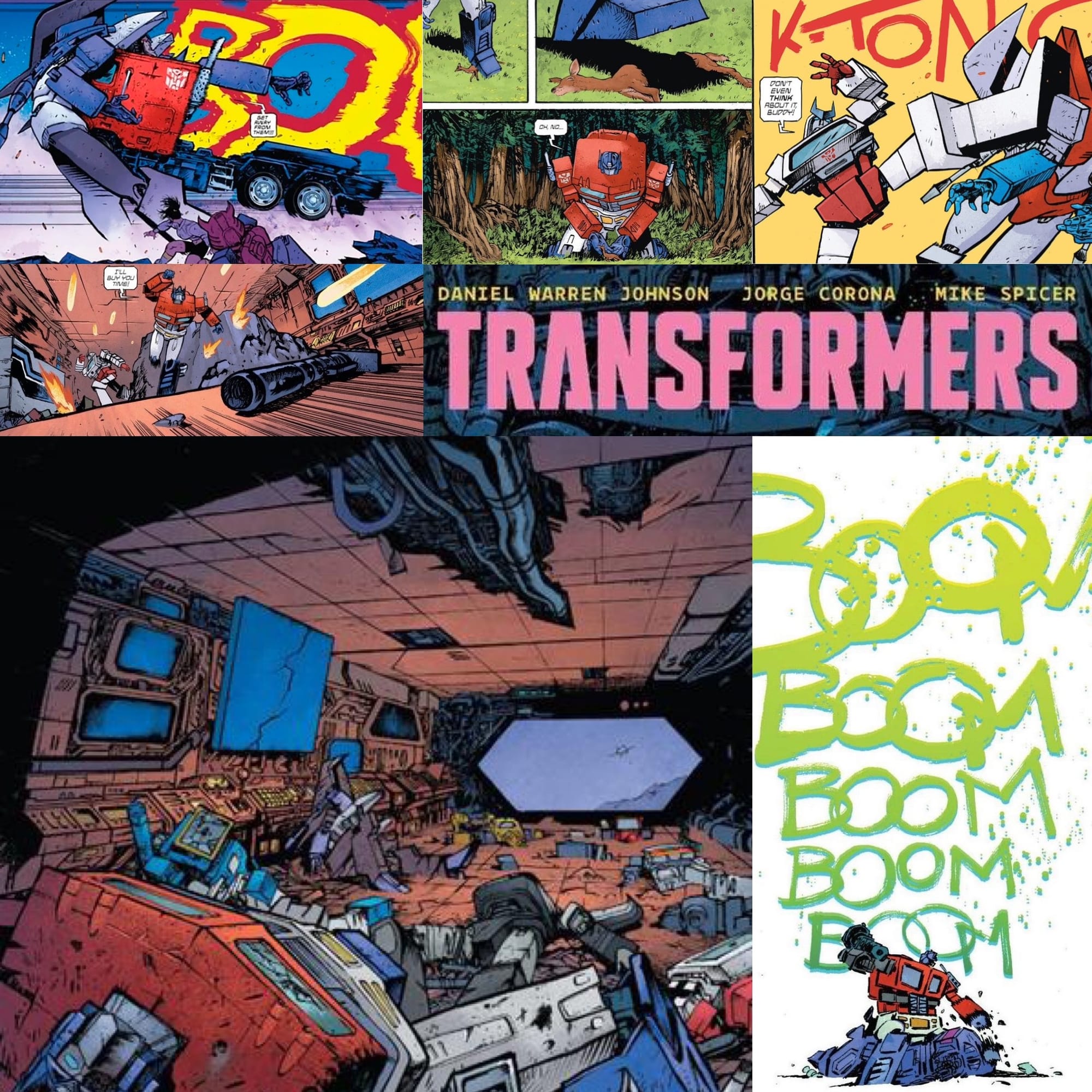
There have been many Transformer comicbooks over the years, and now Daniel Warren Johnson and Mike Spicer take their turn at telling the story of the beloved robots in disguise, as Autobots wage their battle to destroy the evil forces of the Decepticons.
Johnson was also the creative force behind Do A Powerbomb, a fantastic comic book that was a huge suprise for me, and one of my favorites of the year. So I when I heard they were going to be writing Transformers, a long-time childhood favorite of my toy box, as well as an everyday after school watch alongside the Thundercats, G.I. Joe, and the Waltons, especially in the winter when it was too cold and dark to go outside, I was ready. I mean, he made pro-wrestling awesome, a thing I'm only a casual fan of at best, so I was excited to see what he did with something I actually liked. Picking up when Optimus Prime, his allies, and their enemies wake up and find that they have crash-landed on Earth, with the fate of the war-torn homeworld Cybertron unknown, their war resumes on Earth.
It's awesome.
The shocking deaths, wild battles, destruction they visit, not just to the world around them, but to their own metal bodies, as well as the constant scramble to gather enough energy to repair friends and comrades who have been torn apart, just so that they can just re-join the fight and get torn up all over again, again and again, until they're too broken to repair, it's good stuff. The story gives all the old favorites a general tone of weary soldiers fighting a seemingly endless conflict, who keep fighting for no other reason than they just can't envision another option, and it's all done with the classic look of the cartoon too? You can practically hear all the old voices. It's great stuff, big and loud and fun, but also surprisingly grounded, as well as a fresh take. It's just a plain old good comic, one where every issue seems to contain that same feeling of shock and danger that you can remember feeling after watching the first 30 minutes of the original animated Transformers movie.
Plus, I love that Soundwave takes revenge on Starscream for no other reason than Starscream kicked Ravage.
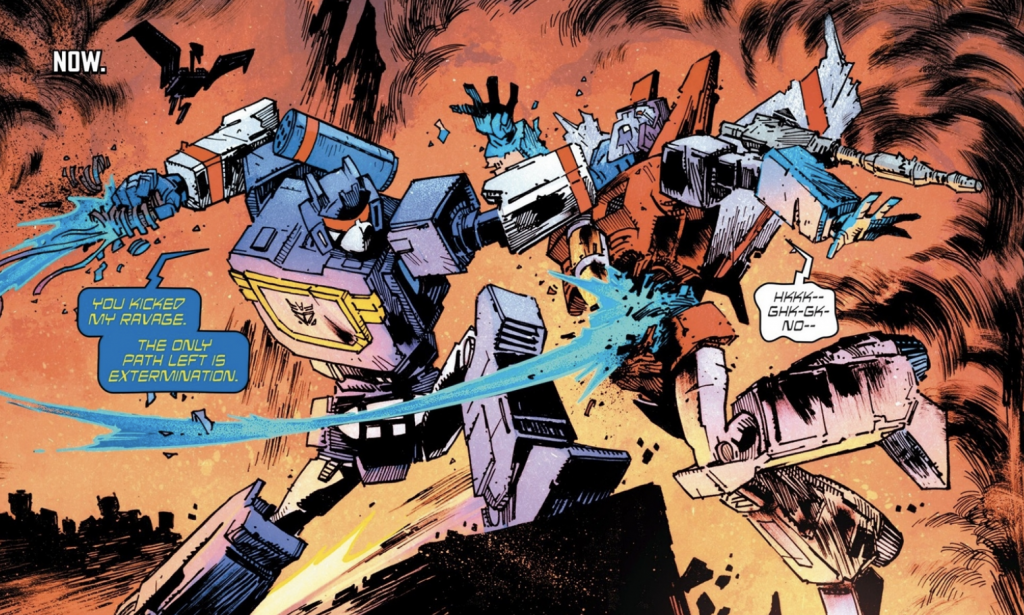
Get his ass, Soundwave!
Ultramega
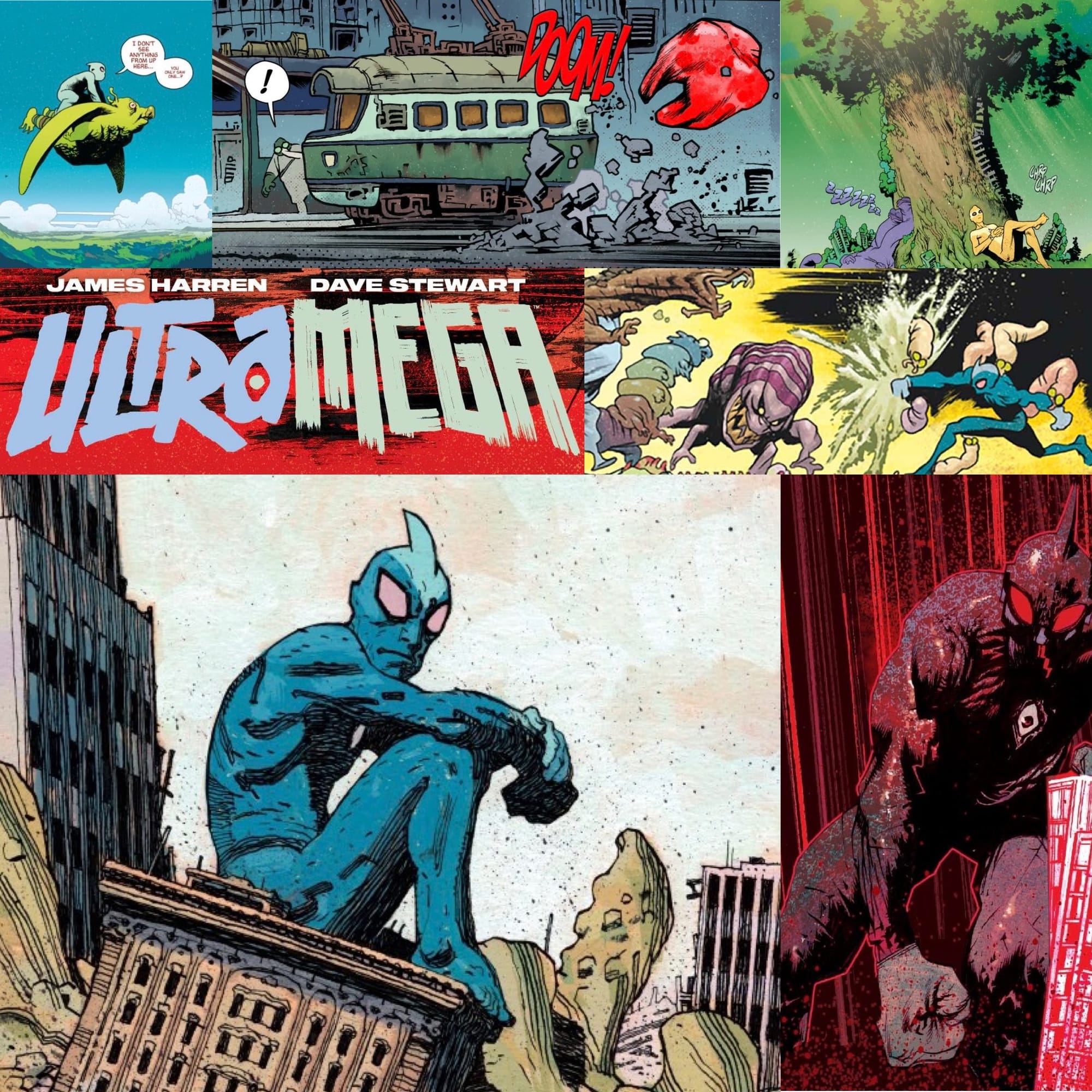
James Harren and Dave Stewart present the next chapter in a strange story of a cosmic plague that transforms regular people into violent, monstrous kaiju, where only three people, imbued with the incredible powers of the Ultramega, can protect against this madness.
But what happens to a world beneath the feet of warring gods when their battles level cities and leave untold horror in their wake? What happens when the gods, not the monsters, fall? Mixing body horror, sci-fi, and post-apocalyptic ideas with the Japanese Tokusatsu genre, featuring elements of kaiju (giant monsters), super sentai (a team of people who transform into superheroes), and kyodai hero (heroes who grow to giant size) stories, volume 1 (the first four issues) introduced us to an ill-fated team of heroes and the horrific fallout of their last battle.
Volume 2 of Ultramega now picks up those pieces, but adds a few new layers, calling into question the mysterious beings that bestow the power on the heroes, as well as the entire reality of the intergalactic war these kaiju and giant heroes fight. Ultramega is bloody, bizarre, and most of all, surprising. There are few comics out there like it. I love it.
Also, when they transforn, the heroes' toes are so weird.
Helen of Wyndhorn
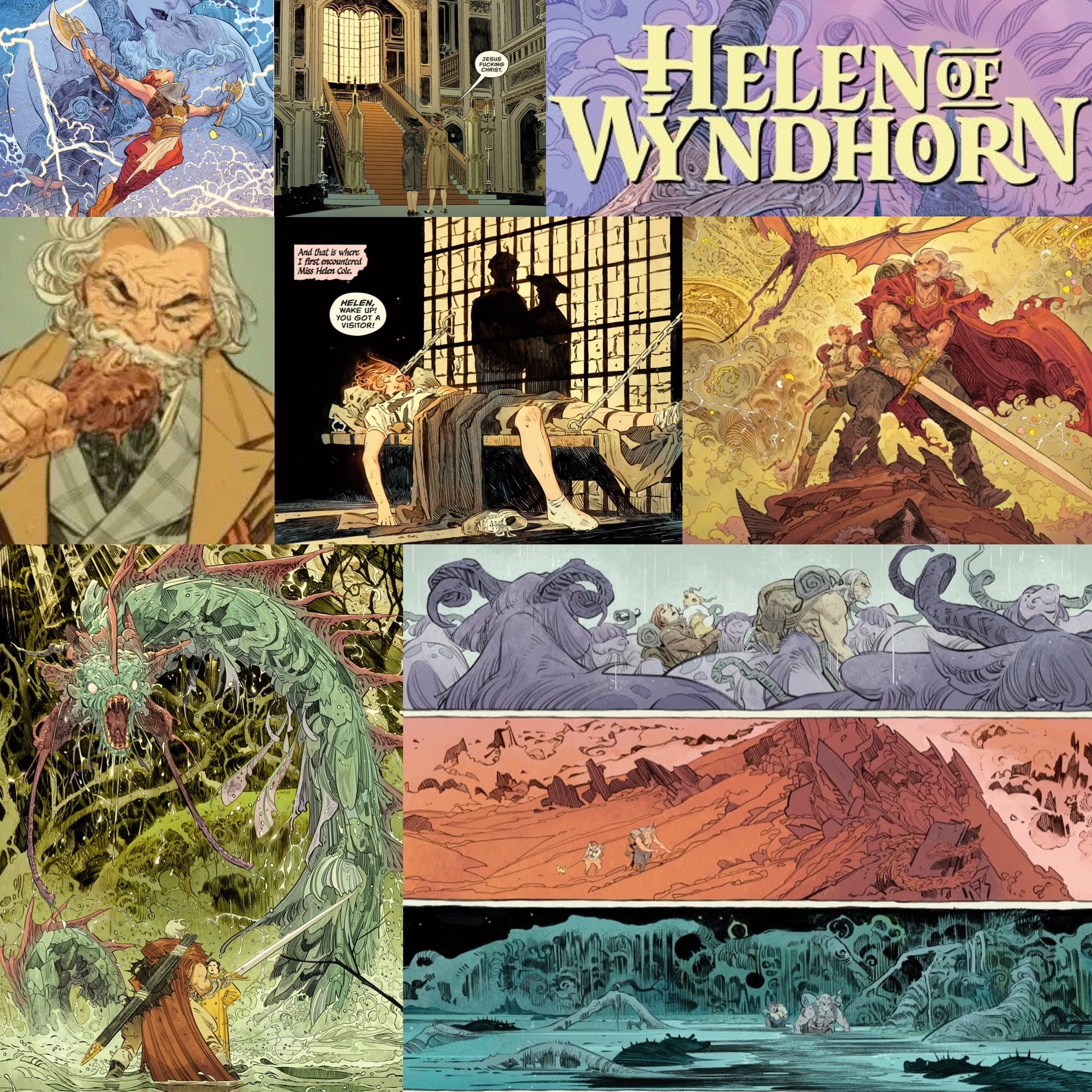
A gothic sword and sorcery epic by Tom King and Bilquis Evely, Helen of Wyndorn is part Conan the Barbarian, part The Wizard of Oz, and part Narnia.
Following the tragic death of her late father C.K. Cole, a pulp writer and creator of the popular barbarian character, Othan, Helen Cole returns to her Grandfather's enormous estate: Wyndhorn House, as she is not quite an adult. Scarred by Cole's untimely passing, and lost in the new, strange world of victorian finery that is the sprawling manse of Wyndhorn House, Helen soon discovers that a myriad of old secrets hide within its many rooms and hall, and also in the woods that lay outside its walls. For within the woods, there lies a passageway that leads to the kind of legendary adventures she once believed only existed within her father's stories. Soon enough, Helen learns that the pulp character of Othan and her grandfather Barnabas Cole have much more in common than she ever would have guessed.
I love Portal Stories, and I love pulp era stories too, that turn-of-the-century jodhpurs and goggles era will always catch my eye. This story pulls heavily from not only the classic tales, but from the stories of their creators. It is also partly told in the pulp story classic way of "recounting the adventure,", although this time, instead of over brandy in the lounge after dinner, it's the second-hand perspective of a governess who was present, someone who witnessed a yet untold tragedy, so there's a mystery aspect there too.
At the start, we meet Helen. A young woman who is angry at the world and trying to stay drunk to avoid her grief at her father's recent suicide. She is a lost soul, and is snoring off a rager in the local jail because of her loutish and drunken behavior, when the just-mentioned governess shows up to collect her, at the behest of her wealthy and mysterious grandfather, Barnabas Cole. He is a veritable giant of a man, gruff and distant, and prone to disappearing with a massive sword across his back for weeks on end in the nearby woods.
Eventually, Helen follows him into those woods...
A story about a pair of lost souls trying to find a connection with the only family they have left, all while adventuring in a mythic land of magic and monsters, Helen of Wyndham is filled with wonders and terrors, big and small, and is an all-around fun read. Plus, the art is great.
Avengers vs Aliens
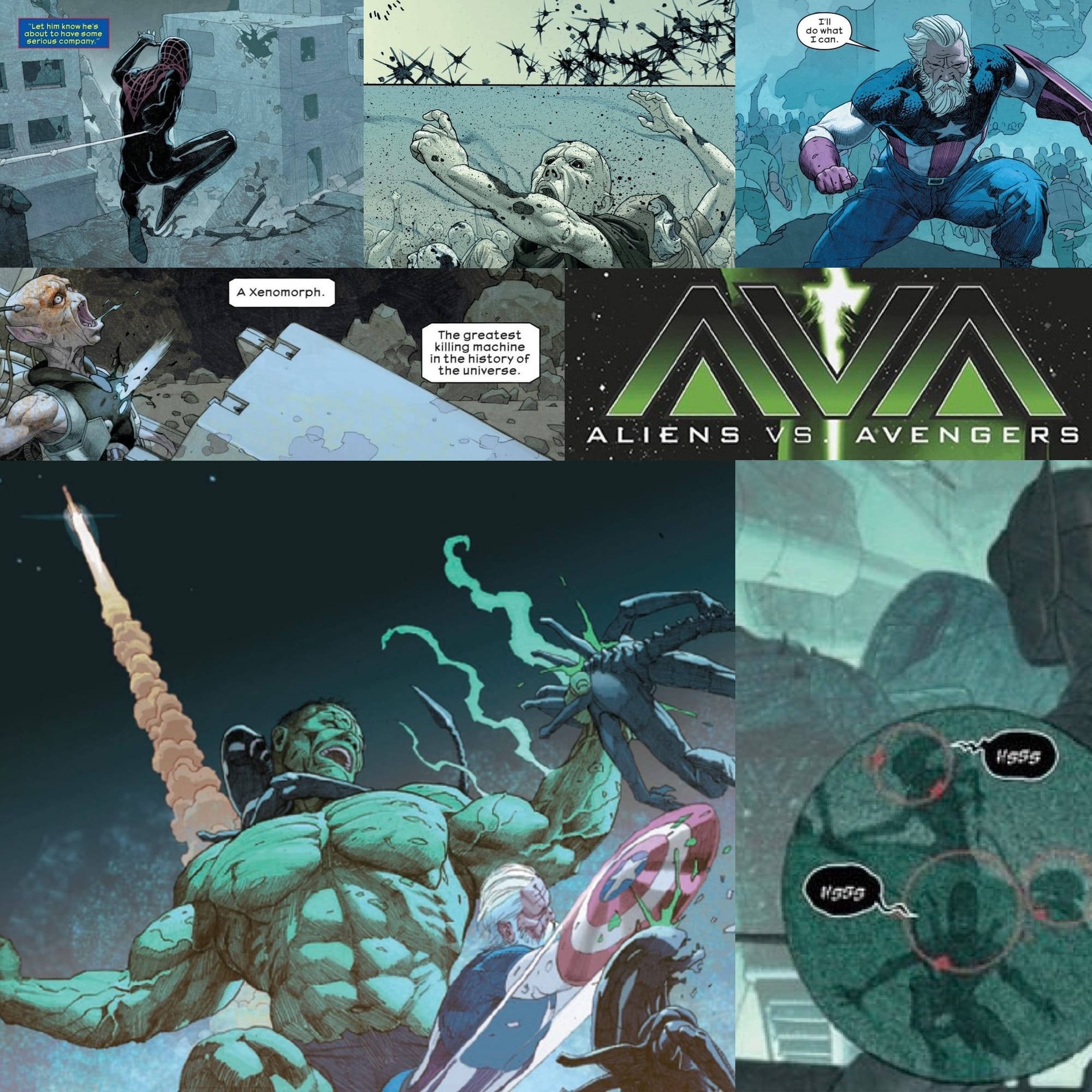
It was inevitable, but the Alien Xenomorphs have finally reached Earth, and they found the Avengers standing in their path! The perfect organism meets a planet of superhumans. Who will be first to fall? By Jonathan Hickman and Esad Ribić.
Normally, I would be wary of a book like this. The Aliens of the Aliens franchise can really only do one thing, and that's kill off most of the characters who run into them, and when it comes to the Big Two, they're generally not very interested in seeing their heroes get killed off, so a crossover like this is usually unavoidably toothless and boring.
But that's not a problem here.
Aliens vs Avengers is basically a What if comic, telling a story of a dark possible ending of the Marvel Universe, which means that a lot of heroes die, and it's often neither noble nor pretty. "What if... the Aliens invaded, and all of the heroes lost?" That's what happens here. Picking up after the majority of the planet has already been overrun by a plague of the all too familiar acid-blooded, face-hugging, chest-bursting aliens, which were unleashed on Earth by a genocidal cabal of David8's who are looking to wipe out all life in the galaxy, and using Weyland-Yutani as a cover to obscure their true agenda, this is clearly a story where the only possible victory for our heroes is going to be simply surviving.
And in a world where most of the population is already dead, which only means more aliens, and most of the surviving heroes have liver spots, survival doesn't seem all that likely.
Surprising, fun, and dark, I love a good story about slowly turning the lights out on a universe. But while I definitely love things like the Venom Symbiote taking over a symbiote, or Mr. Sinister's clones using a gun that shoots Face-Huggers, or seeing Captain America and the Hulk's final stand, I will never not be mad that I have lost the battle, and that people are now openly calling the alien creatures Xenomorphs, as if it were a proper name, instead of a scientific classification.
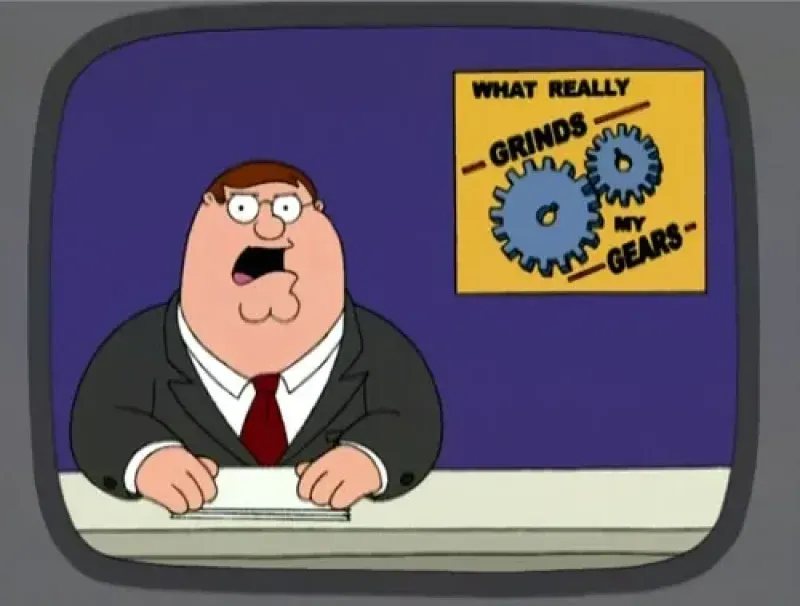
Because a scientific classification is how Lt. Gorman meant it when he first uses the term during the briefing in the movie Aliens. He tells the squad of Colonial Marines that "A Xenomorph might be involved" in the situtation they're about to investigate. When he says "Xenomorph," it's clearly a technical place-holder term, where "Xeno" means "alien" and "morph" means "form" as in "creature."
He did this for two reasons. One, the creatures were still new and unknown at this point, unstudied, so they didn't have a name, at least as far as humans knew. So this was just him basically saying "unknown creature." Also, he used the term specifically because he was green as grass little butterbar Lieutenant, who was strutting about, thinking he was better than a bunch of grunts, all while desperately hoping they wouldn't notice how inexperienced he was. Basically, what I'm saying here is, the term "Xenomorph" isn't the Alien creatures' name, it's a way of saying "some kind of animal," the same way cops will refer to an "unknown subject" as an "unsub." It's not their name! Any unknown alien creature could be known as a Xenomorph, damn it! And yet, in the comic, they are constantly calling the fucking thing a Xenomorph.
It really grinds my gears.
But whatta ya' gonna do?
The world is too shitty to waste on Nerd Grievances anymore, I guess. Anyway, great book. I love Ribic's art, and I love Hickman's writing.
Nice House by the Sea
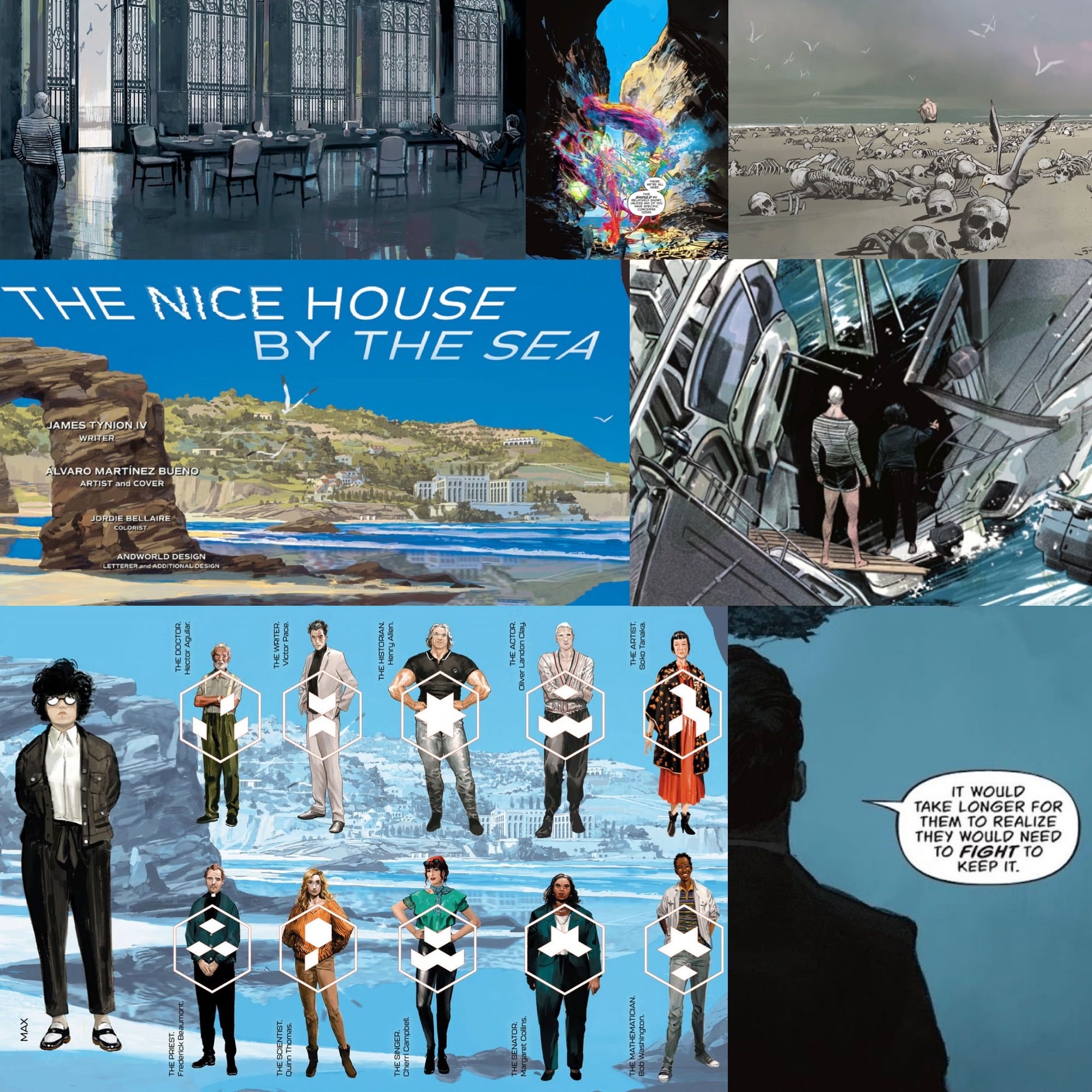
In part two of the story that began in The Nice House on the Lake by James Tynion IV and Álvaro Martínez Bueno, we find a new, different house, one that is run by a new, different alien shepherd, also written and drawn by Tynion and Bueno.
Instead of Walter, the mysterious alien creature running this hous, this... xenomorph, if you will... is known as Max. But where Walter chose his friends to occupy his House by the Lake, no one invited to this House by the Sea knew Max. But she knew each and every one of them. Masters of their own respective fields, titans of industry and knowledge, each one represents the best and brightest of humanity, if not the most caring, or even all that friendly. So what happens when this pack of wolves, long used to taking what they want, realize that they aren't the only house, that they aren't the only enclave of survivors after the rest of the planet was destroyed by demonic-alien fire. What will they do once they realize that, in the end, only one house–the final flame, the last of humanity–will be allowed to survive?
It's still very early in this new part two storyline, but it continues to be unexpected, ratcheting up the tension, all of which is constantly interspersed with reminders of the bad end that awaits all of these characters lurking somewhere in the possibly near future. How do they get there? Why does it ends this way?
I don't know.
But these news characters in this new house definitely point towards some of the possible reasons. And all of this happening while the question of who exactly these aliens/demons, Walter and Max, are, where they come from, and why their people destroyed everything and everyone on Earth except for a really nice house of ten carefully chosen people, is still slowly unfolding.
Plus, if we know that there's now two houses, does that mean there's a third one? A fourth? How many Houses are there?
Image Comics: The Horizon Experiment
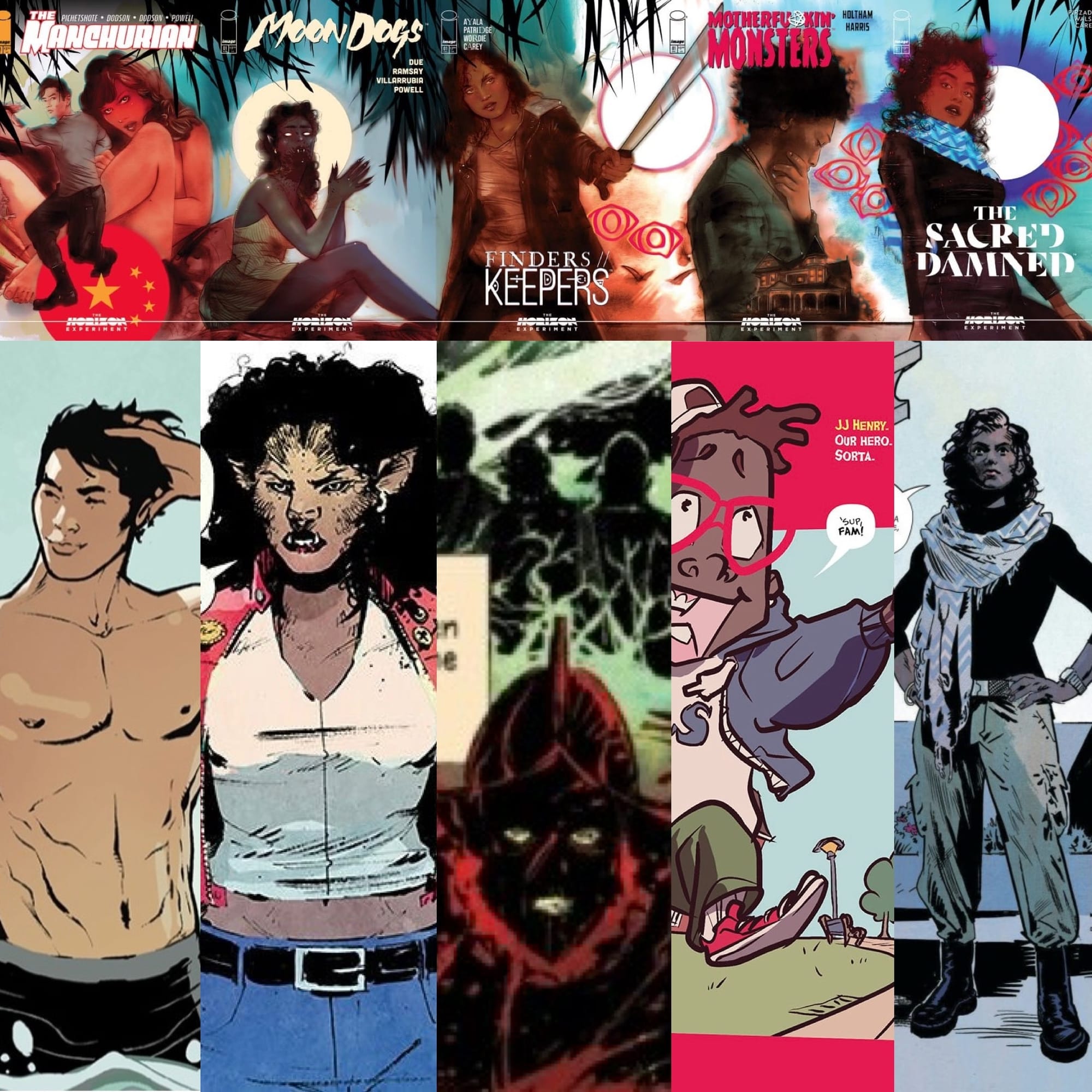
The Horizon Experiment is a comics anthology launched by Thai-American comic book creator Pornsak Pichetshote.
There are five books, one issue each, all done by different creative teams from comics, literature, TV, and film, each one featuring a different character/idea. There's The Manchurian, about a Chinese James Bond. There's Moondogs, about East African werewolves in Miami. Then there's Finders Keepers, about a Puerto Rican reverse Indiana Jones robbing museums to return artifacts to their cultures, and then there's Motherfucking Monsters, which is basically an Evil Dead for Black nerds. Finally, there's The Sacred Damned, which centers on a Muslim exorcist, basically a middle eastern woman version of DC Comic's John Constantine.
They're all fun little one-shots, like the comic book version of a TV pilot, and I think they might continue depending on sales. I don't have any information on that, but I'd be happy with any of them continuing on.
It's true, these are just a handful of one-and-done like introductions of stories, meant to be representative of what could come, if the books were able to continue, so, yeah, they aren't hugely satisfying, at least as far as narratives go. But still... they're all undeniably well-done, to the point where I find some of the more strident criticisms out there to be pretty suspect, and clearly rooted in some sadly all too familiar reasons from the usual kind of people. What these books do have in spades is pontential. They could definitely be something good. I especially enjoyed Finders Keepers by writer Vita Ayala and artist Skylar Patridge. A heist book, as well as an adventure story, the whole idea of a reverse Indiana Jones breaking into museums to liberate stolen artifacts is a great idea. Loved it.
That said, admittedly, what I really liked is how each comic features original protagonists from marginalized backgrounds set in a popular genre and inspired by pop culture icons, but all done by diverse creators. I really liked how those different perspectives, when coupled with the characters' unique backgrounds, allowed these stories of classic archetypes to explore new directions. It's a good idea, and I'm interested in seeing more of these, of more new ideas. Either way. Serve it up.
Plus, the fact that this kind of thing pisses off the bigots so much is always a good thing. So there's a little cherry on top of that already delicious sundae for you.
We Call Them Giants
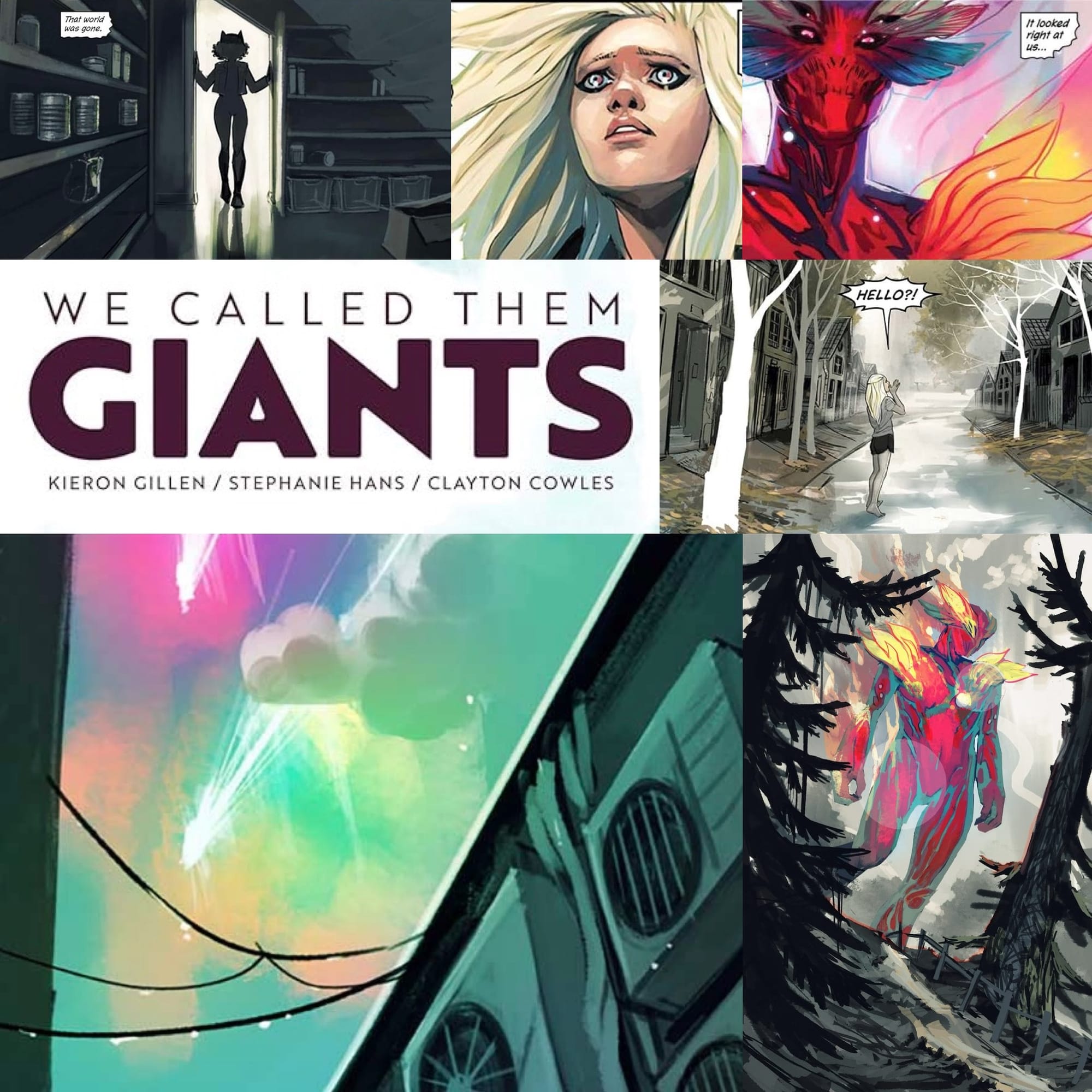
We Called Them Giants is a stand-alone story by writer Kieron Gillen and artist Stephanie Hans. It's about what happens when foster kid Lori wakes to find the streets, and the whole world, to be empty. Or at least, nearly empty. She’s quickly thrown into a new world where she has to scrape by, scavenging in the ruins of civilization, nearly starving, and hiding from the gangs when…
The giants arrive.
And while We Called Them Giants is a post-apocalyptic story, it is mostly about love and friendship and communication across a massive gulf of understanding. Stephanie Hans' art is fantastic here, as is Gillen's writing, but what makes this story so good for me, is how it takes a surprising turn with the arrival of the giants, and you realize that this is actually a story about having pets.
Once the giants arrive and the characters shelter with them, you quickly recognize that it's actually a story about loving your pets, and caring for them, and how some of them love you back immediately, while others are stand-offish and take a while to warm up. It's about how you will talk to your pets, and they will talk to you, and while neither of you speak the same language, you somehow seem to understand each other, like when their food is late. It's also about how they will curl up with you for warmth each night, and how worried you get if one of them manages to get out, and how you'll defend them if they're ever threatened by other animals or by some random asshole who lives in the neighborhood, even if you get hurt in the prcess. It's about all of that, but mostly from the pet's point of view.
So that was nice. I liked that a lot.
Ultimate Spider-man
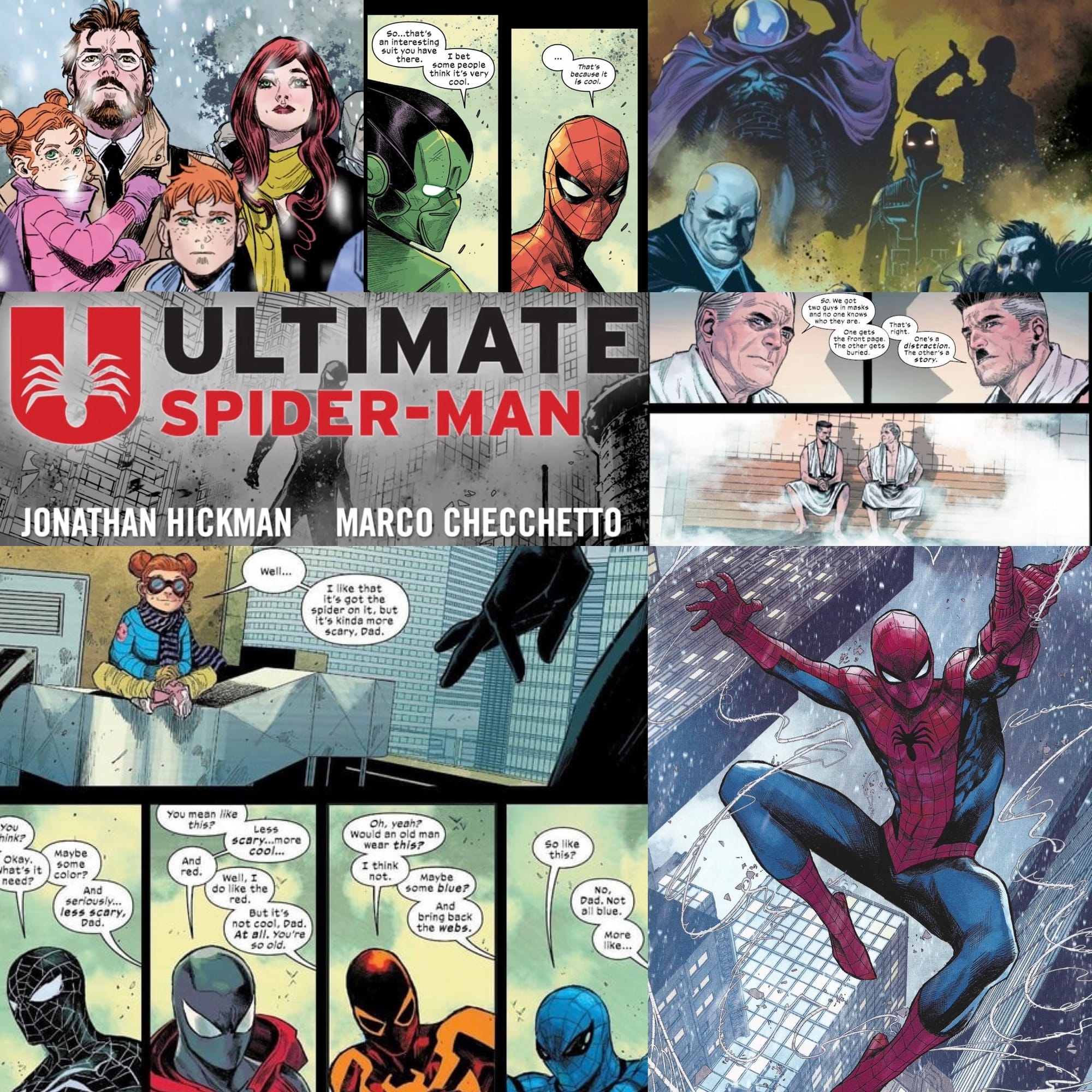
Jonathan Hickman and Marco Checchetto guide the new Ultimate Spider-man through the new Ultimate Universe, proving that it's never too late to be a hero.
I love a good comic book reboot.
The original Ultimate Universe started around 2000. It was meant to be a jumping-on point for new readers, a way of retelling the classic stories of Marvel's well-known characters from the 70s and 80s, all of their origins and foundational adventures, but in more of a modern setting. The intent was to make all of these older character more accessible to modern audiences, while freeing them up from decades worth of continuity. It was extremely successful, and not only laid the groundwork for a lot of the look and feel of the MCU, but gave us Miles Morales too. Then, a few years back it was wiped out of existence as a result of the big Multiversal re-shuffling that was the Secret Wars (2015). These things happen. One of the very few characters to survive was Miles.
The other was The Maker.
The Maker is the Utlimate Universe version of Reed Richards from the Fantastic Four. It's kind of a long story, but he went bad. And since Reed Richards is one of the smartest men to ever live, The Maker is very dangerous. He's so dangerous that it's hard to use him effectively as a run-of-the-mill villain. Much like Doom, the guy is a world-conqueror. So, realizing that the heroes of the main Marvel comics universe are simply too entrenched for him to ever successfully defeat, the Maker escapes to another universe. He then takes it over by systematically ensuring that the superheroes who could’ve given him any trouble never exist, or if they do end up existing, he subverts them to his will, building a new world in his own twisted, stretchy, and villainous image.
Unfortunately for the Maker, the best laid plans and all that...
And so we have the really fun set up for the new Ultimate Universe.
So, after a whole thing, the Tony Stark of this universe figures out whats going on, and in an effort to counter The Maker, he starts jumping around in time, activating as many of the heroes-that-never-were that he can find in the hopes of building an army, saying: "These people stole your future. These people robbed you of your destiny. The question is… do you want it back?" and then he provides them with the means to do so.
Peter Parker is one of these heroes.
Years before, the Maker prevented that famous radioactive spider from biting Peter while on a class field trip, Now a married and middle-aged dad, he finally gets his spider bite and begins to explore the world as Spider-man, a world where his villains are more experienced, and the cards are stacked against him even more. And while the faces are the same, his family and friends are just as different as he is. It's a familiar retelling that takes surprising turns, like... for instance... Aunt May is dead, and Uncle Ben is not, and it's a small but fundamental change to the mythos. The whole book is like that, the problems are the same, but the details are all different, and much like the original version of Ultimate Spider-man, it is a consistently great read.
Absolute Batman
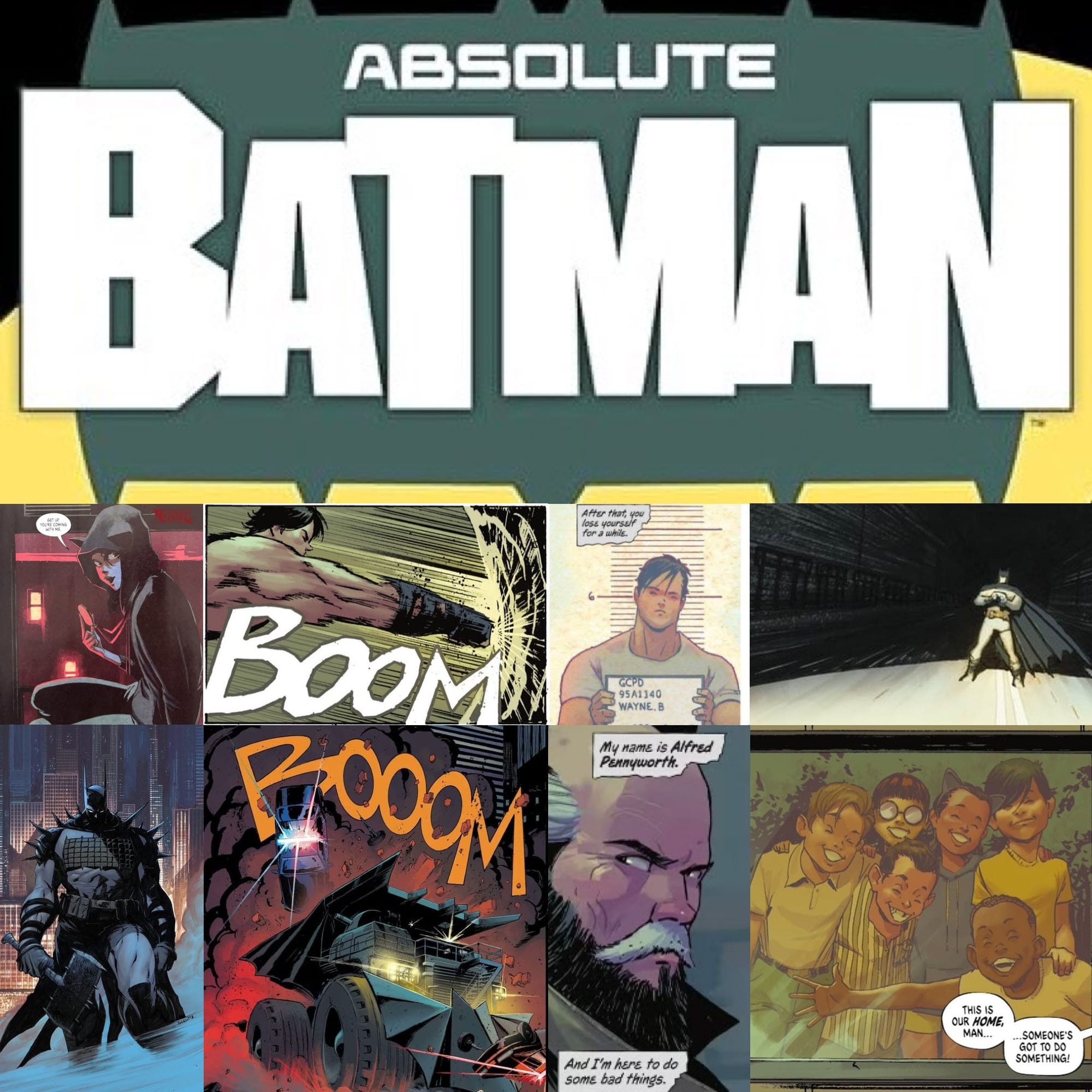
Without the mansion…without the money…without the butler…what’s left is the Absolute Dark Knight! Scott Snyder and Nick Dragotta show us how, even in a dark alternate universe, there's still a Batman.
I did not expect to like Ultimate Batman.
The design of the character, the look of the world, it all screamed that is was going to be yet another "grim and gritty" version of the caped crusader to me, and I've talked about how tired I am of that shit before now. And to be fair, it totally is another grim and gritty version.
But also... it's kinda great.
The way Bruce becomes Batman, the reasons why, the way Batman responds to criminals, the gear he uses, even his cape… it’s all very much Batman, but it's also suprising and new and different. Honestly, I’m really enjoying this “new” version of the character, and I am usually not interested in angry Batman, the dark knight and emo avenger. Here, Bruce doesn't have his great wealth, which means that he doesn't have endless resources. He certainly doesn't have the Bat-Family, or his web of super-operatives or Justice League colleagues. He has to be clever and more resourceful. He has to make different decisions. This a working-class Bruce Wayne with a chip on his shoulder andf a grudge. And yet, depsite being more brutal and much darker, Batman's focus is clearly on preserving life, preventing violence, and saving innocents. I love that addition, something that is usually forgotten in the usual grim and gritty Batman power fantasies.
He's also huge. Part of it is Dragotta's style, which I'm a big fan of, but it's also a reflection of how Bruce's origin and training has had to be muchh different. Gone is the scalpel, this is sledge hammer. Or more appropriately, the battle-axe, which he wears as his chest-piece. Pure fantasy, obviously, but still cool. As are the many changes to his supporting cast, from his recognizable group of childhood friends, to his mom, and even to Alfred. But for all these changes, the core of the character is still the same. Gotham is a sewer of crime and corruption, and Batman has a never-ending mission.
Fun, familiar, and unpredictable, Absolute Batman is a reboot of maybe the most well-known superhero ever, featuring a story that is wildly NOT the Batman you know, but at the same time, completely, unabashedly and... absolutely... is who the Batman truly is.
Good ideas: The Ultimate and Absolute Universes
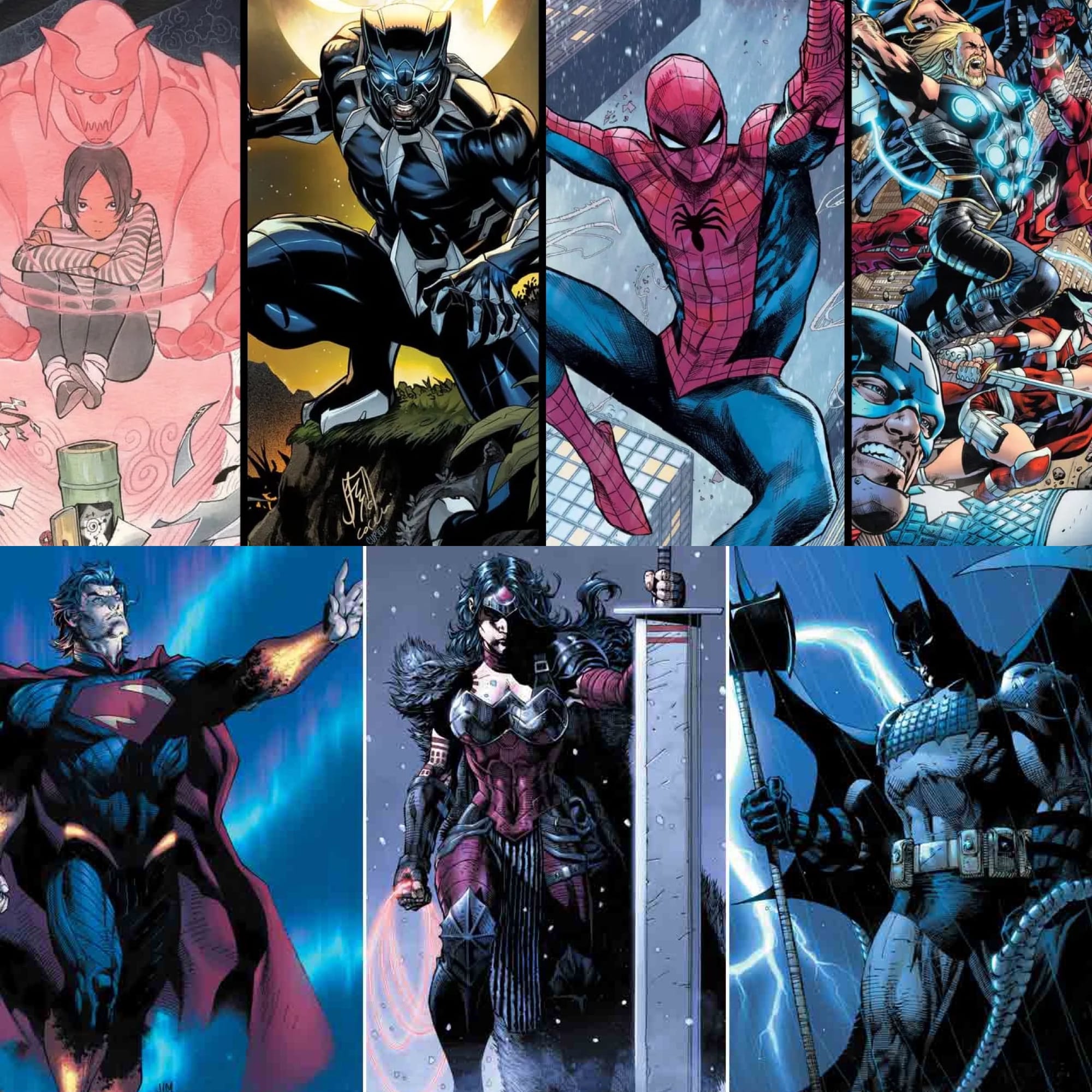
Long-term continuity is both a blessing and a curse for superheroes comics.
On one hand, it builds your characters and their worlds. It gives them their nuances, their flaws, foibles, loves, and hates. It creates their relationships, with all their ups and downs. It also provides a certain gravitas to the culmination of current stories, and to fights with old enemies. Long-term continuity is how these characters become known quantities. It makes them familiar, comfortable, relatable, and reliable.
But it can also make these well-known characters too well-known, blocking any chance of character growth, severely narrowing what was once limitless. It makes once vibrant and interesting characters seem out-of-step with the times. It makes them slow and old and boring, unable to adapt, resistant to change. In effect, too much adherence to Long-term Continuity cements characters in amber. It freezes them in place. Even worse, decades of Long-term Continuity can make good characters feel inaccessible to new readers. The continual flow of stories can be intimidating, like a rushing river, allowing for no easy place for fresh eyes to jump in and start swimming. This is especially true when these stories are overly-reliant on events and stories that took place years, even decades before, the kinds of stories that, even if a new reader does want to read them, just aren’t easy to get ahold of read, either due to cost or simple availability.
And that’s not even taking into account how silly the idea is.
Characters who have been around awhile, like Batman for instance, who has almost 90 years of stories… those 90 years are not one single story, not even in the main title, and yet, too many older fans treat it that way. Older fans will often view those 90 years of Batman stories as a novel, but the reality is, they’re a series of the most nominally connected vignettes, all written by a myriad of different creators of wildly divergent agendas and levels of talents. The various creator runs on the same character can be so different from one another, they might as well be telling stories about different characters. This can render the past actions of the character as incongruous to who the character is now, or... if you're an stubborn older fan who is stuck in the amber of Long-term Continuity, it means the new character isn't acting how the character is supposed to act.
It's all so tedious.
This is why, in my opinion, comic book universes should reboot every ten years. Wipe the slate clean and start anew. There’s no value to making new stories that are wholly reliant on stories that are decades old. It's ridiculous. Marvel is still talking about the death of Gwen Stacy, and that shit happened before I was born, and I am older than dirt.
In my opinion, despite whatever bonuses it may provide, comic books are a vast ocean and long-term continuity are the chains around the neck of today’s creators, choking the creative life out of them and dragging them down beneath the water's surface, forcing the best creators to be beholden to the near-sighted whims and terrible nonsense of the worst of them.
This is why I love the Ultimate and Absolute Universes.
As I mentioned above, the original Ultimate Universe was meant as a jumping-on point for new readers, a way to retell their classic stories in a more modern setting, and it did just that. This new Ultimate Universe is even more interesting, because while it’s built off the old Ultimate Universe, the only thing you need to know is that Maker is a refugee from two universes, and has taken over a third to mold it in his own image. That’s interesting, because technically, this reboot, this jumping-on point for new readers, this brand new universe, it has its own long term continuity, but it’s not dependent on it at all. It informs actions, but it's not required for you to know this, and as a result, it isn’t limited by its story foundations and history, and all while it benefits from it.
That’s an impressively creative idea. I'm a fan.
The most immediately apparent bonus to this set-up is the allowance of change. The old Ultimate Universe was very much a reaction to a post 9/11 world. In the old version, the Ultimates, which is what the Avengers are called there, were an arm of the government, like a super-powered SEAL Team. But in this version, as the Maker controls the world, the Ultimates are a group of underground resistance fighters dedicated to fighting fascism, and those in power call them “terrorists." That's a small bit of fluidity and creativity that being trapped in amber would simply not allow.
Meanwhile, the Absolute Universe is basically DC comics trying to do what Marvel comics already did with the Ultimate Universes, relaunch classic characters, make them more accessible for new readers, tell classic stories from a new point of view, and all sans the long years of boring continuity baggage. And just like the Ultimate Universes, so far... it's been wildly successful... because the books are good.
How exactly the Absolute Universe came about, story-wise, well, that was a bit... unclear. There was some weird bullshit about Darkseid (DC's version of Thanos), and he was doing something, and he basically creates this "evil" version of the DC universe? I don't know. It was a bunch of technobabble. But the upside is... Don't worry about. It doesn't matter. All you need to know is that the Absolute Universe is basically a reboot of your classic DC heroes, but all bets are off, no one is safe, and nothing is sacred.
And yet... it completely gets the core of the characters.
It's all good, fun, creative stuff.
Special mention: Something is Killing the Children and Saga
This is a pair of long-running titles that still deliver every month. Few books do this. The original Ultimate Spider-man was one. It ran for over a decade with the same creative team. Over 120 issues. Every month. Great read. These two comics are the same. They’re long on-going stories, but they’re all easily available in trade paperback, and they're both worth your time diving into.
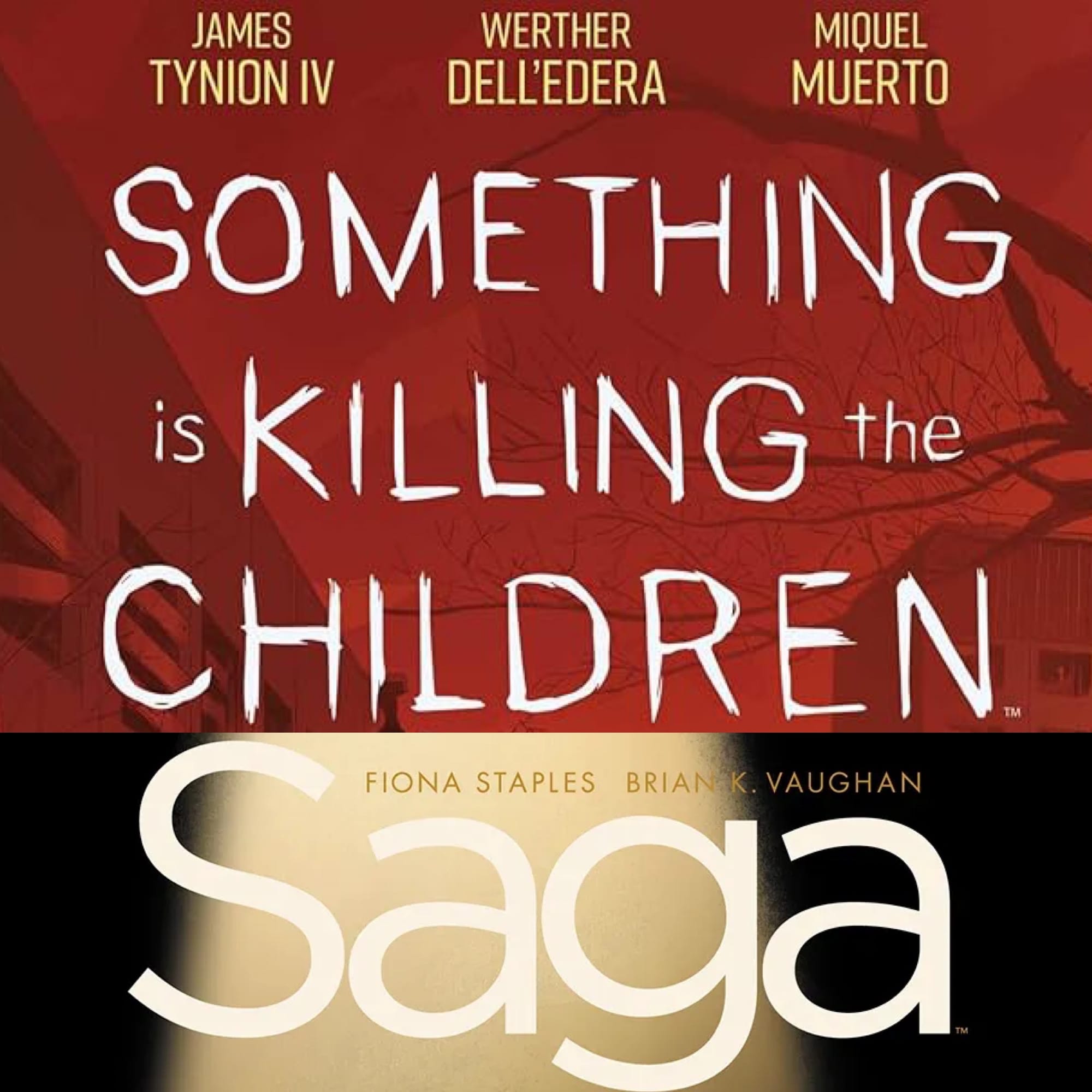
With 41 issues published so far, and created by writer James Tynion IV and artist Werther Dell'Edera, the synopsis for the first story arc of Something is Killing the Children goes like this…
"When the children of Archer's Peak begin to go missing, everything seems hopeless. Most children never return, but the ones that do have terrible stories—impossible stories of terrifying creatures that live in the shadows. Their only hope of finding and eliminating the threat is the arrival of a mysterious stranger, one who believes the children and claims to see what they can see. Her name is Erica Slaughter. She kills monsters. That is all she does, and she bears the cost because it MUST be done."
Something is Killing the Children is the tale of a lone Monster Hunter, the evil monsters she hunts, and the monsters from her past, and the secret organization that made her, who are hunting her, and all while she is on a never-ending quest to save innocent children from the very real monster under their bed... or in their closet... or down the dark hallway... or waiting in the woods...
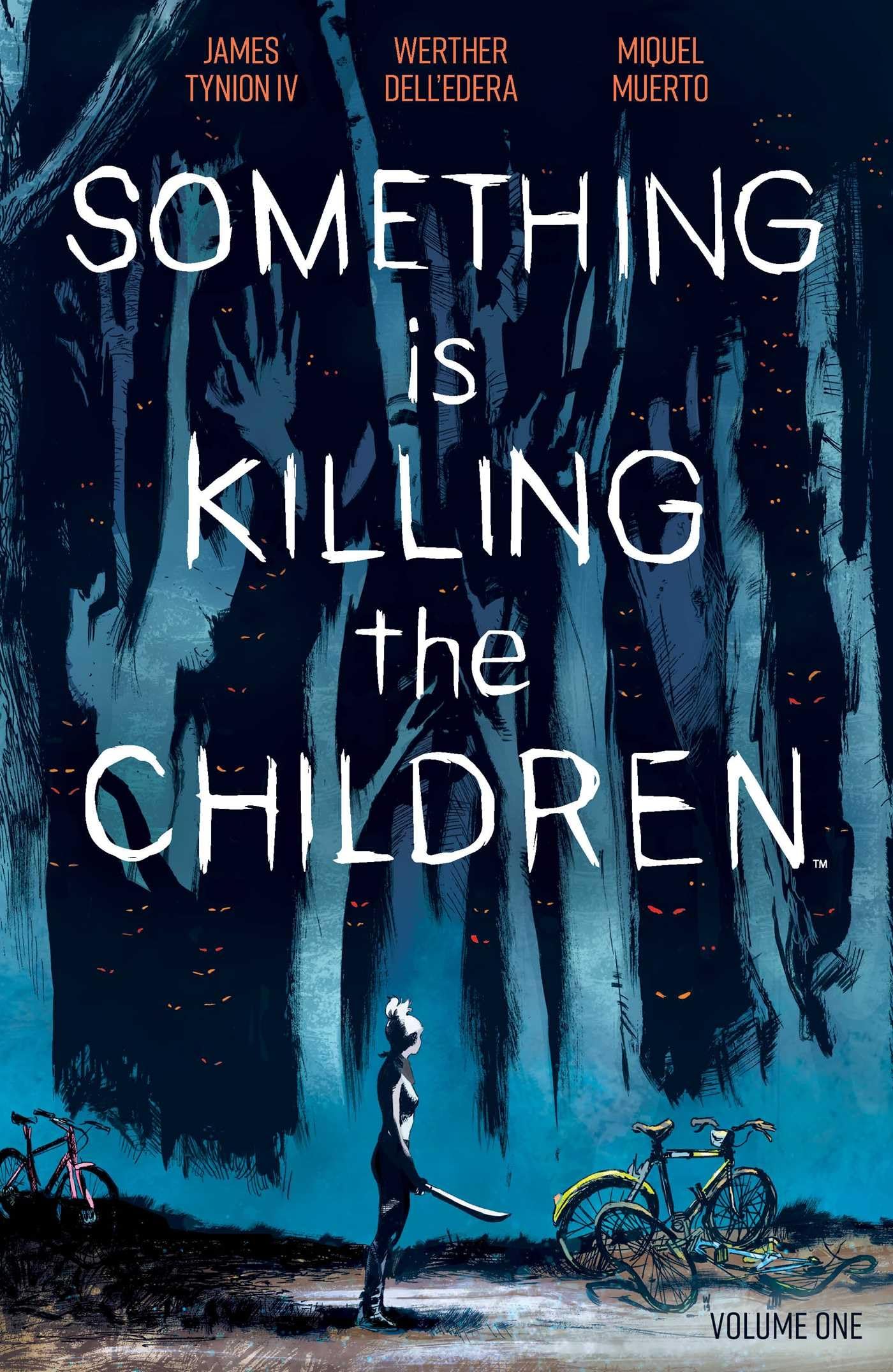
Meanwhile...
With the stated intention of 108 issues, and with 72 of them currently released, Saga is an epic space opera/fantasy comic book by writer Brian K. Vaughan and artist Fiona Staples, and the series synopsis goes like this…
Two lovers from long-warring extraterrestrial races, Alana and Marko, flee authorities from both sides of a galactic war as they struggle to care for their newborn daughter, Hazel, who occasionally narrates the series.
Saga a story of love and tragedy and the loss of innocence in a cold universe, at turns hilarious, touching, sad, and shocking, as found family forms and just tries to survive. It's just... good stuff. Plus, it regularly upsets some of the worst people in this country, which is always a good thing. You definitely should pick up the trades and start reading Saga if you're not already.

Simple fact... both of these books are reliably good reads. Every month. And being that they're longer stories, they will probably benefit from the multi-issue versions you get when you buy the trade paperbacks.
Definitely worth your time. Highly recommended
Finally, some interesting potential...
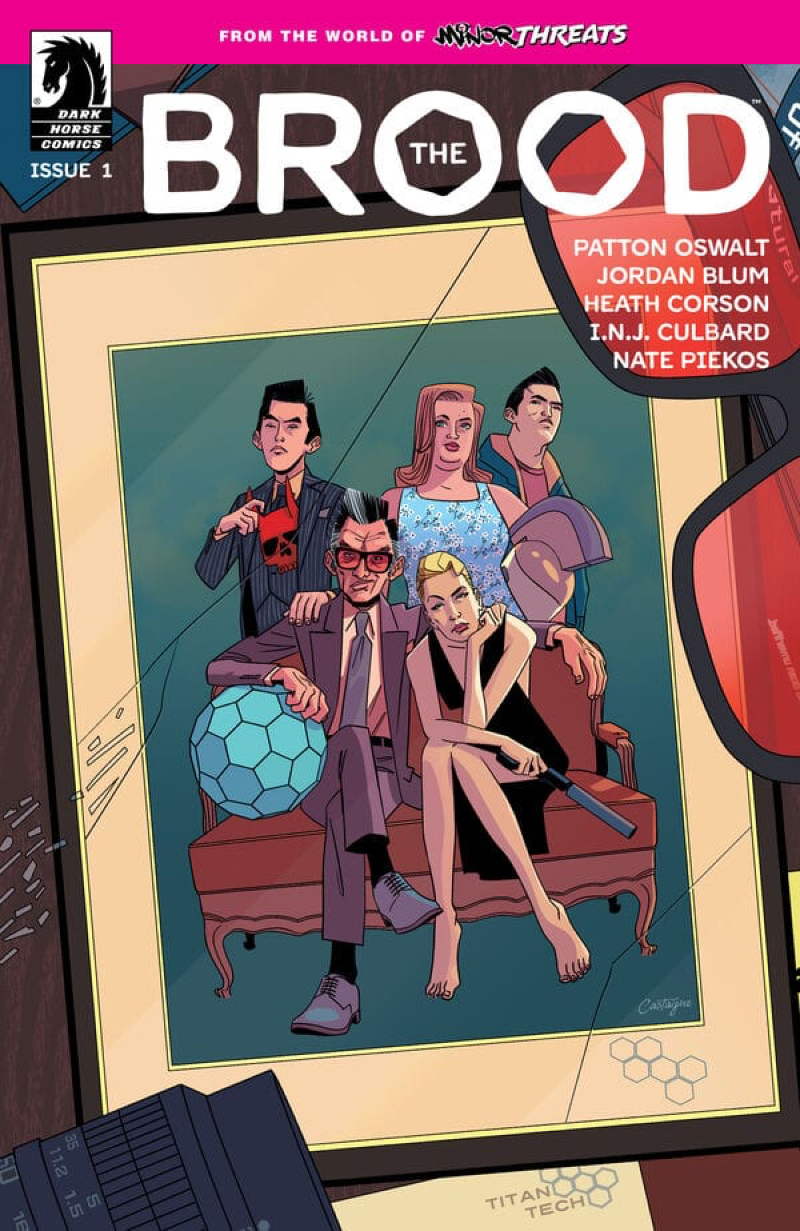
I’ve talked about the comics in The Minor Threat Universe last year, and The Brood is the latest book.
The brainchild of Jordan Blum and Patton Oswalt, with co-writing on this title by Heath Corson, and art by Ian Culbard, if the main Minor Threats books are a love letter to the world of the D-tier theme supervillains, and The Alternates was a love letter to the world of Veritgo comics, then The Brood is a family drama about the greats, the big leagues, the well-known names in supervillany.
The story is not just about the relationship between Napoleon Archimedes, the world’s greatest super-science supervillain, and his arch-nemesis The Searcher, the world’s greatest hero. It is also about the realtionship between him and his wife, Contessa Villanova, the assassin known as the Killer Queen, and his three adult children. Athena, a bioengineering prodigy and burgeoning supervillain who yearns for her father's approval. Simon AKA Spookshow, a master occultist who chafes at his father's sneering dismissal of his skills. And Ben, the eldest and the favorite, a tactical wunderkind, who not only wants nothing to do with the family business, but has secretly become a cop. Also, there's Intellectus, a former military AI Android that gained sentience, went rogue, and is now Napoleon's occasional partner-in-crime, and maybe his only friend... All of this comes into focus when Napoleon Archimedes realizes that he’s dying. What will be his legacy? Who will take over the family business?
The Brood is short mini-series, just four issues, that's basically Succession meets The Royal Tannebaums, but with supervillains, and so far, it’s a great read.
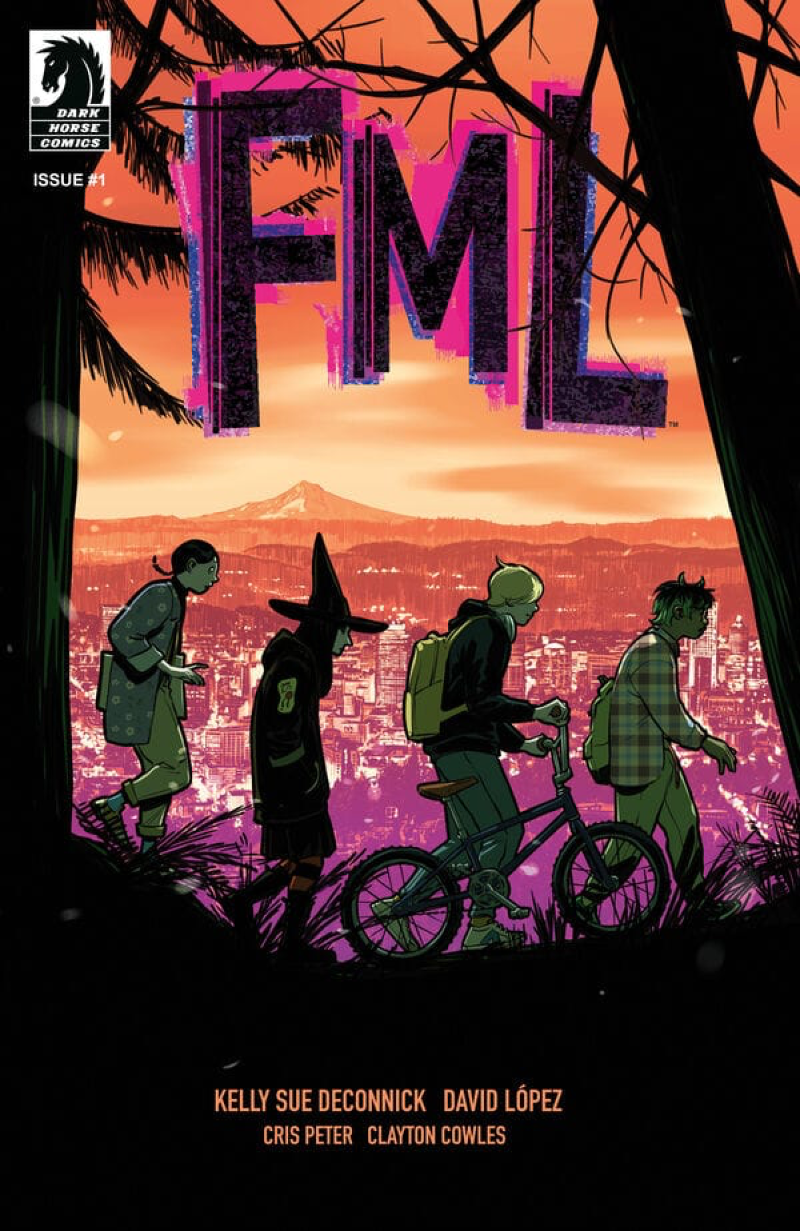
Written by Kelly Sue DeConnick, with art by David Lopez, FML is a surreal and possibly semi-autobiographical tale of DeConnick's life as a former person with a name and interests and activities who now finds themselves to be a parent.
It's the story of how, one day her baby boy becomes a hairy and horned monster, all in a post 9/11, post Trump, post COVID world of wild fires, n95 masks, school shooter drills, Elon Musk, helicopter parenting, true crime, and the emboldened rise of racist white America, all with echoes of the tragic and unsolved mystery of the murder of Mia Zapata. On top of that, there's all the Gen Z quirks, foibles, and anxieties exhibited by her two childen, one searching for her identity on the cusp of no longer being a child and becoming a teen, and one that is well into being a teen and trying to be an adult, but is still a big hairy child too. And this is all mixed up with the usual litany of oh-so-precious "Portland is a magical land" bullshit that you always see, and that’s fine. I get it. I do. When you’re just Minneapolis, except smaller and whiter, you have to cling to what can. And I say this while fully admitting that I live in Minneapolis, which is just Chicago’s small town hick wannabe cousin, who lives next door to a city that is basically just Des Moines, Iowa with delusions of grandeur, so this is all said with love and totally self-aware shade, but god damn it... one of the quirky kids wears a witch hat all the time, which I hate.
But still...
It's good. I was wary of the book, obviously. I kind of avoided it, but then I saw that the Ol' Comics Shoppe had all three issues, just one copy each, all of them just sitting there on the shelf like they were waiting there just for me, and I thought to myself: "Fuck it. Why not? The world's ending." So I picked them up, and I loved them. They're a great read. Funny. Cute. Sincere. Unpredictable. Sadly relatable as an old Gen Xer who is old, even though I'm not a parent. Plus the art is fantastic. I am looking forward to more issues. So far, so good. Worth checking out.
We'll see what the year ahead holds for these books.
And that’s it. That's a little window into one of my escapes while the Empire collapses in flames around me. Hopefully I’ll see you all next year—may we all still be alive then–for a new list. Who knows, maybe we'll get lucky and the meteor will miss us, right?
Probably not, but... maybe.
